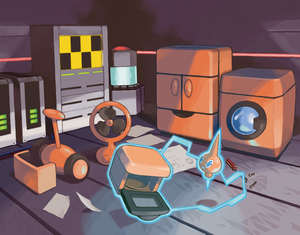List of Pokémon with form differences

|
This article is incomplete. Please feel free to edit this article to add missing information and complete it. Reason: Additional information on the Generation VII species |
Some Pokémon have official major variations between individuals, known as forms (Japanese: すがた form). These variations all have differing sprites in the games and are recognized by the "forms" section of the Pokédex.
Starting in Pokémon HeartGold and SoulSilver, every official different form has a name given by the Pokédex, but Arceus, Genesect, and Furfrou's alternate forms were not registered in the Pokédex prior to Pokémon Omega Ruby and Alpha Sapphire. From Generation II to IV, whichever sprite is seen first will be the one displayed in the Pokédex by default; e.g., if West Sea Shellos was encountered first its sprite will appear in the Pokédex by default, whereas if East Sea Shellos was encountered first its sprite will. In Pokémon Black and White, the sprite displayed in the Pokédex can be changed after interacting with Cedric Juniper in Mistralton City, even to a Shiny sprite, if it has been encountered. This option is automatically applied in Pokémon Black 2 and White 2. In Generation VI onwards, the sprite can be changed as long as the player has owned the Pokémon.
At times, these differences are purely cosmetic and have no bearing on the difference in the Pokémon's stats from another; however, several Pokémon differ in stats (other than HP), type, and Ability depending on their form. Among these are several Legendary and Mythical Pokémon, whose unique forms can be changed between at will and are usually spelled as Formes (Japanese: フォルム Forme).
In Pokémon Sun and Moon, regional variant Pokémon were introduced. The species of Pokémon that adapted to the environment of Alola are called Alola Forms, and have different appearances, types and abilities to Pokémon of the same species found elsewhere.
Pokémon with multiple forms
Pikachu
Cosplay Pikachu
- Main article: Cosplay Pikachu
Cosplay Pikachu is a unique female Pikachu who has a black heart-shaped mark near the end of its tail. This unique Pikachu is able to be dressed up into different costumes corresponding to each of the five conditions (Coolness, Beauty, Cuteness, Cleverness, and Toughness) and learn an exclusive move associated with that condition. Cosplay Pikachu can switch costumes anytime at any Contest Hall. It will lose the move it had with the last costume (if it still knows it), and gain the move from the new costume. If Cosplay Pikachu removes its costume while the only move it knows is the move tied to its costume, it learns Thunder Shock.
Unlike other Pikachu, it cannot evolve or breed. Additionally, Cosplay Pikachu cannot be deposited into Pokémon Bank; instead, it can only be traded between copies of Pokémon Omega Ruby and Alpha Sapphire. Cosplay Pikachu is not present in any other games.
In Pokémon Omega Ruby and Alpha Sapphire (the only games it appears in), after the player takes part in their first Pokémon Contest Spectacular, a Pokémon Breeder will give the player Cosplay Pikachu.
Pikachu Electric |
Cosplay Pikachu File:Spr 6o 025 C.png Electric |
Pikachu Rock Star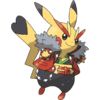 Electric Meteor Mash |
Pikachu Belle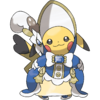 Electric Icicle Crash |
Pikachu Pop Star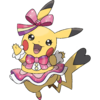 Electric Draining Kiss |
Pikachu, Ph. D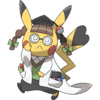 Electric Electric Terrain |
Pikachu Libre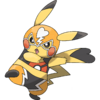 Electric Flying Press |
Pikachu in a cap
- Main article: Ash's Pikachu → Pikachu in a cap
These cap-wearing Pikachu are event-exclusive Pokémon that debuted in Pokémon Sun and Moon, and are being distributed in celebration of the Pokémon anime's 20th movie, and by extension, the anime's 20th anniversary. Like Ash's Pikachu, these Pikachu are always male and cannot evolve or breed. They also have access to the exclusive Z-Crystal, Pikashunium Z, and its Z-Move, 10,000,000 Volt Thunderbolt.
Six variants exist in Sun and Moon, one for each of Ash's hats between the anime's original series and its Sun & Moon series. A seventh variant debuts in Pokémon Ultra Sun and Ultra Moon, wearing the (Japanese: キミにきめたキャップ I Choose You Cap), Ash's hat from the 20th movie.
Pikachu Electric |
Original Cap Pikachu  Electric |
Hoenn Cap Pikachu  Electric |
Sinnoh Cap Pikachu  Electric |
Unova Cap Pikachu 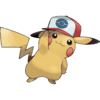 Electric |
Kalos Cap Pikachu  Electric |
Alola Cap Pikachu  Electric |
I Choose You Cap Pikachu File:025Pikachu-M20.png Electric |
Pichu
- Main article: Spiky-eared Pichu
Spiky-eared Pichu is a unique female Pichu who has a tuft of hair on the end of its left ear. Spiky-eared Pichu's Pokéathlon performance stats are different than a normal Pichu's. She cannot evolve or be traded, and she cannot be transferred to the Generation V games.
In Pokémon HeartGold and SoulSilver (the only games it appears in), if the player takes a Pikachu-colored Pichu to the Ilex Forest, Spiky-eared Pichu will join the player.
Pichu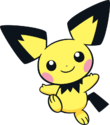 Electric |
Spiky-eared Electric |
Unown
Unown has many forms, each corresponding to a typographical character. It was the first Pokémon to have multiple forms in the games. From its debut in Generation II, there are 26 forms of Unown, each corresponding to each of the twenty-six letters of the Latin alphabet. Starting in the Generation III games, Unown has two additional forms, corresponding to the question mark and exclamation mark. These forms are not interchangeable.
In Pokémon Gold, Silver, and Crystal, there is a special Unown Mode, an upgrade to the Pokédex that was developed by the researchers at the Ruins of Alph to record the different forms of Unown, which is available after the player has caught several Unown. In Pokémon HeartGold and SoulSilver, there is the Unown Report, which is obtainable after the player completes the first tile puzzle in the Ruins of Alph.
In the Generation II games, Unown's form is determined by its IVs, which results in some strange phenomena; for example, in Generation II, only Unown I and V can be Shiny due to Shiniess also being determined by IVs in these games. In the Generation III games, Unown's form is determined by its personality value. From the Generation IV games onward, an independent value determines the Pokémon form.
Though the form has no bearing on base stats, punctuation Unown have different performance stats to alphabetical Unown.
A
|
B
|
C
|
D
|
E
|
F
|
G
|
H
|
I |
J
|
K
|
L
|
M
|
N
|
O
|
P
|
Q
|
R
|
S
|
T
|
U
|
V
|
W
|
X
|
Y
|
Z
|
! |
? |
Castform
Castform has four different forms, which its Ability Forecast causes it to change between in different types of weather. It is the first Pokémon to have interchangeable forms in battle in the games.
Normally, Castform is Normal-type and has a plain appearance with a gray body. It takes on this form in clear weather, in any weather without a specific form, and if the weather has its effects negated by Cloud Nine or Air Lock.
In harsh sunlight, Forecast changes Castform to its Sunny Form, which is Fire-type and resembles the sun. In rain, Forecast changes Castform to its Rainy Form, which is Water-type and resembles a raindrop. In hail, Forecast changes Castform to its Snowy Form, which is Ice-type and resembles a snowy cloud. Castform reverts to its normal form when withdrawn from battle.
In Generation III and IV, if Castform's Ability Forecast is suppressed or replaced, Castform will remain in its current form (regardless of the weather). In Generation V onward, if Castform's Ability Forecast is suppressed or replaced, Castform will revert to its normal form (regardless of the weather).
Castform's stats do not change between any of these forms.
Normal Normal |
Sunny Form Fire |
Rainy Form Water |
Snowy Form Ice |
Deoxys
Deoxys has four different forms which it can switch between. It was the first Pokémon whose base stats and move compatibility differed depending on its form.
In the Generation III games, Deoxys's forms are game-specific, such that it will always be in one particular form while in the player's possession (although it will be in Normal Forme in the wild).
- In Pokémon Ruby and Sapphire and Pokémon Colosseum and XD, it will be in Normal Forme.
- In Pokémon FireRed, it will be in Attack Forme.
- In Pokémon LeafGreen, it will be in Defense Forme.
- In Pokémon Emerald, it will be in Speed Forme.
From Generation IV onward, the player can switch between its forms using meteorites found in the game.
- In Pokémon Diamond, Pearl, and Platinum, using meteorites outside in Veilstone City.
- In Pokémon HeartGold and SoulSilver, using meteorites outside on Route 3.
- In Black, White, Black 2, and White 2, using meteorites in the Nacrene Museum in Nacrene City.
- In Pokémon X and Y, using meteorites in the Fossil Lab in Ambrette Town.
- In Pokémon Omega Ruby and Alpha Sapphire, using the meteorite in Professor Cozmo's house in Fallarbor Town.
- In Pokémon Sun and Moon, using the meteorite next to Sophocles in the Hokulani Observatory in Mount Hokulani.
Deoxys's Normal Forme is the default form it takes, as well as the form it appears in in Pokémon Ruby and Sapphire. In this form, its stats are more balanced, though it is notably far more offensive than it is defensive.
Deoxys's Attack Forme has higher Attack and Special Attack than its other forms (being the non-Mega Evolved Pokémon with the highest Attack and Special Attack) and learns more offensive moves. Its Defense and Special Defense are abysmal, much lower than its Normal Form. Its Speed remains the same as its Normal Forme.
Deoxys's Defense Forme has much higher Defense and Special Defense than its other forms and learns more defensive moves. Its Attack and Special Attack are much lower than its Normal Forme, and its Speed is also significantly lower than its Normal Forme.
Deoxys's Speed Forme has much higher Speed than its other forms (being the Pokémon with the highest Speed) and learns many increased priority moves.
Deoxys has the same HP stat in all of its forms.
|
|
|
| ||||||||||||||||||||||||||||||||||||||||||||||||||||||||||||||||||||||||||||||||||||||||||||||||||||||||||||||||||||||||||||||||||||||||||||||||||||||||||||||||||||||||
| Lv. |  Normal Forme Psychic |
 Attack Forme Psychic |
 Defense Forme Psychic |
 Speed Forme Psychic |
|---|---|---|---|---|
| 1 | Leer | |||
| Wrap | ||||
| 7 | Night Shade | |||
| 13 | Teleport | Double Team | ||
| 19 | Knock Off | Taunt | Knock Off | |
| 25 | Pursuit | Spikes | Pursuit | |
| 31 | Psychic | |||
| 37 | Snatch | Superpower | Snatch | Swift |
| 43 | Psycho Shift | |||
| 49 | Zen Headbutt | |||
| 55 | Cosmic Power | Iron Defense | Agility | |
| Amnesia | ||||
| 61 | Recover | Zap Cannon | Recover | |
| 67 | Psycho Boost | |||
| 73 | Hyper Beam | Counter | Extreme Speed | |
| Mirror Coat | ||||
| Moves in bold are STAB. Moves in italics do no damage. | ||||
Burmy and Wormadam
Both Burmy and its female evolution, Wormadam, have three separate forms. Burmy can change form freely, changing its cloak depending on the environment in which it last participated in a battle (so Exp. Share alone will not change its form). Wormadam cannot change form; when a Burmy evolves into Wormadam, it retains its cloak.
Apart from breeding and evolution, Burmy's cloak is purely cosmetic; conversely, different cloaks of Wormadam have different types, stats and learnsets. Bred Burmy will have the same cloak as the mother, will be in the same cloak as a Burmy or Wormadam bred with Ditto, or will be in Plant Cloak if bred from a Mothim and a Ditto.
If a Burmy last battled in a grassy area or water, it changes into its Plant Cloak. If female, Plant Cloak Burmy will evolve into Plant Cloak Wormadam, which is a Bug/Grass Pokémon. This cloak is composed of leaves and twigs.
If a Burmy last battled in a sandy or rocky area, it changes into its Sandy Cloak. If female, Sandy Cloak Burmy will evolve into Sandy Cloak Wormadam, which is a Bug/Ground Pokémon. This cloak is composed of sand and rocks.
If a Burmy last battled in a building or urban area, it changes into its Trash Cloak. If female, Trash Cloak Burmy will evolve into Trash Cloak Wormadam, which is a Bug/Steel Pokémon. This cloak is composed of pink insulation.
Plant Cloak Bug |
Sandy Cloak Bug |
Trash Cloak Bug |
|
|
| ||||||||||||||||||||||||||||||||||||||||||||||||||||||||||||||||||||||||||||||||||||||||||||||||||||||||||||||||||||||||||||||
| Lv. |  Plant Cloak Bug Grass |
 Sandy Cloak Bug Ground |
 Trash Cloak Bug Steel | ||
|---|---|---|---|---|---|
| 1 | Quiver Dance | ||||
| 1 | Metal Burst | ||||
| 1 | Sucker Punch | ||||
| 1 | Tackle | ||||
| 1 | Protect | ||||
| 1 | Bug Bite | ||||
| Evo. | Quiver Dance | ||||
| 10 | Protect | ||||
| 15 | Bug Bite | ||||
| 20 | Hidden Power | ||||
| 23 | Confusion | ||||
| 26 | Razor Leaf | Rock Blast | Mirror Shot | ||
| 29 | Growth | Harden | Metal Sound | ||
| 32 | Psybeam | ||||
| 35 | Captivate | ||||
| 38 | Flail | ||||
| 41 | Attract | ||||
| 44 | Psychic | ||||
| 47 | Leaf Storm | Fissure | Iron Head | ||
| 50 | Bug Buzz | ||||
| Moves in bold are STAB. Moves in italics do no damage. | |||||
Cherrim
Cherrim changes form depending on the weather. During harsh sunlight, it changes into Sunshine Form; otherwise, it is in its Overcast Form. Due to its Ability Flower Gift, its Attack and Special Defense will also increase in its Sunshine Form.
In Generation IV, Cherrim changes form independently of its Ability. Starting in Generation V, it is Cherrim's Ability that changes its form.
In Japanese, the names of Cherrim's forms use 「フォルム」 form, the term otherwise only used in the names of forms localized as Forme in English.
Overcast Form Grass |
Sunshine Form Grass |
Shellos and Gastrodon
Shellos and Gastrodon differ in appearance depending on where they were caught. This is purely a cosmetic change, and these Pokémon cannot change between forms.
In Sinnoh, West Sea Shellos and Gastrodon are encountered west of Mt. Coronet, and are pink in color; East Sea Shellos and Gastrodon are encountered east of Mt. Coronet, and are blue in color. There is also a slight difference in bodily appearance depending on the form.
Bred Shellos are the same form as their mother, or the same form as the Shellos or Gastrodon parent if bred with Ditto.
West Sea Water  Water Ground |
East Sea Water  Water Ground |
Rotom
- Heat redirects here. For the Badge given by Flannery, see Badge → Heat Badge.
Rotom has five alternate forms it can change between, in addition to its normal form. To take on these alternate forms, Rotom possesses a different household appliance, and each has its own special move. These alternate forms were introduced in Pokémon Platinum.
- Normal Rotom, which has not possessed an appliance, is Electric/Ghost
- Heat Rotom, which has possessed a microwave oven, knows Overheat and is Electric/Fire
- Wash Rotom, which has possessed a washing machine, knows Hydro Pump and is Electric/Water
- Frost Rotom, which has possessed a refrigerator, knows Blizzard and is Electric/Ice
- Fan Rotom, which has possessed an electric fan, knows Air Slash and is Electric/Flying
- Mow Rotom, which has possessed a lawnmower, knows Leaf Storm and is Electric/Grass
In Generation IV, all forms of Rotom are Electric/Ghost-type; from Generation V onward, the appliance forms replace the Ghost type with the type of their associated move. All appliance forms have the same base stats, with a higher total than that of normal Rotom; the only base stat of normal Rotom that is higher than its appliance forms is its Speed.
- In Pokémon Platinum, the appliances are located in Rotom's Room in the Team Galactic Eterna Building, which can only be accessed by using the Secret Key.
- In Pokémon HeartGold and SoulSilver, the appliances are located in Rotom's Room in Silph Co., which can be accessed when entering the broken elevator with Rotom as the walking Pokémon.
- In Black, White, Black 2, and White 2, the appliances are located in boxes in the basement of Shopping Mall Nine.
- In Pokémon X and Y, the appliances are located in boxes on the second floor of the Sycamore Pokémon Lab in Lumiose City.
- In Pokémon Omega Ruby and Alpha Sapphire, the appliances are located in boxes in Professor Birch's lab in Littleroot Town.
- In Pokémon Sun and Moon, the appliances are located in boxes in Professor Kukui's lab in Hau'oli Outskirts.
Using these locations, Rotom can also return the appliance to change back to normal form.
Upon changing from an appliance form, it will forget the special move associated with that appliance form. Upon changing into an appliance form, it will learn the special move associated with the form. When changing form, if Rotom knows four moves but not the special move of its previous form, the player will be prompted to replace a move with the new exclusive move (Rotom cannot change to an appliance form unless it does). If Rotom's only known move is its special move and it changes to its normal form, then the Rotom will learn Thunder Shock. In Generation IV and V, if Rotom forgets the move that is tied to its appliance form, it changes back into its normal form; in Generation VI, Rotom can remain in an appliance form even if it forgets the associated special move.
Hatched Rotom are always in normal form.
In Generation IV, Rotom changes back to its normal form when taken into the Union Room or Wi-Fi Club, or when deposited in the Day Care.
Rotom's appliance forms first appeared as silhouettes in August 2008, shortly before the Japanese release of Pokémon Platinum, with a statement that indicated that these Pokémon would be in the game. Days before the game's release, it was revealed that these Pokémon were the alternate forms of Rotom. These new forms made their debut in Pokémon Platinum, and have been included in every core series game since.
|
|
| ||||||||||||||||||||||||||||||||||||||||||||||||||||||||||||||||||||||||||||||||||||||||||||||||||||||||||||
|
|
| ||||||||||||||||||||||||||||||||||||||||||||||||||||||||||||||||||||||||||||||||||||||||||||||||||||||||||||
Giratina
Giratina has two forms it can change between. The Origin Forme was introduced in Pokémon Platinum.
In the Pokémon world, it is normally in its Altered Forme, which is a winged hexapod; in the Distortion World or while holding a Griseous Orb, it is in its Origin Forme, which is serpentine with six appendages.
The two forms have different stats and Abilities; the Origin Forme is more offense-oriented, while the Altered Forme is more defense-oriented.
|
| ||||||||||||||||||||||||||||||||||||||||||||||||||||||||||||||||||||||||||||||||||||
Shaymin
Shaymin has two forms it can change between. The Sky Forme was introduced in Pokémon Platinum.
Normally, Shaymin is in its Land Forme, which is Grass-type and resembles a hedgehog. When exposed to a Gracidea, Shaymin transforms into its Sky Forme, which is Grass/Flying-type and white in color; however, Shaymin's Sky Forme will change back into its Land Forme at night, while frozen, when deposited into the PC (prior to Generation VII), when withdrawn from the PC (Generation VII), when deposited into Pokémon Bank, or when deposited in the Pokémon Day Care/Pokémon Nursery.
The two forms have different stats, Abilities, types, learnsets, and cries.
|
| ||||||||||||||||||||||||||||||||||||||||||||||||||||||||||||||||||||||||||||||||||||
| Lv. | File:492Shaymin-Land.png Land Forme Grass |
 Sky Forme Grass Flying |
|---|---|---|
| 1 | Growth | |
| 10 | Magical Leaf | |
| 19 | Leech Seed | |
| 28 | Synthesis | Quick Attack |
| 37 | Sweet Scent | |
| 46 | Natural Gift | |
| 55 | Worry Seed | |
| 64 | Aromatherapy | Air Slash |
| 73 | Energy Ball | |
| 82 | Sweet Kiss | |
| 91 | Healing Wish | Leaf Storm |
| 100 | Seed Flare | |
| Moves in bold are STAB. Moves in italics do no damage. | ||
Arceus
Arceus has eighteen different type form variations, which correspond to the eighteen different types.
Arceus's type depends on its held Plate or type-specific Z-Crystal, becoming the same type as the type that Plate enhances or the Z-Crystal corresponds to, remaining Normal-type when not holding a Plate or Z-Crystal.
While its base stats remain constant despite its changing type, its Pokéathlon performance differs. Additionally, it can learn Draco Meteor only while holding the Draco Plate.
In the Generation IV games, there is unused data and a sprite programmed for a ???-type Arceus, but it cannot be obtained in the games as there is no ???-type Plate. This data no longer exists in Generation V due to the removal of the ??? type.
Prior to Pokémon Omega Ruby and Alpha Sapphire, Arceus's alternate forms are not registered in the Pokédex.
Normal 
|
Fire 
|
Water 
|
Electric 
|
Grass 
|
Ice 
|
Fighting 
|
Poison 
|
Ground 
|
Flying 
|
Psychic 
|
Bug 
|
Rock 
|
Ghost 
|
Dragon 
|
Dark 
|
Steel 
|
Fairy 
|
Basculin
Basculin has two different forms, the Red-Striped Form and the Blue-Striped Form. The Red-Striped Form has a red stripe with wide eyes and spiky fins; the Blue-Striped Form has a blue stripe with squinted eyes and smooth fins. These forms are non-interchangeable.
- In Pokémon Black and Black 2, red-striped Basculin can be encountered normally, while blue-striped Basculin can only be encountered by surfing on or fishing in rippling water.
- In Pokémon White and White 2, blue-striped Basculin can be encountered normally, while red-striped Basculin can only be encountered by surfing on or fishing in rippling water.
- In Pokémon X, blue-striped Basculin can only be encountered using a Good Rod while red-striped Basculin can only be encountered using a Super Rod. This order is reversed in Pokémon Y, with red-striped Basculin requiring a Good Rod and blue-striped Basculin requiring a Super Rod. Route 21 is the exception, where only red-striped Basculin can be caught with either rod.
Bred Basculin are the same form as their mother, or the same form as the Basculin parent if bred with Ditto.
Wild red-striped Basculin have a 5% chance of holding a Deep Sea Tooth while wild blue-striped Basculin have a 5% chance of holding a Deep Sea Scale.
In Pokémon Black and White, blue-striped Basculin have the same two standard possible Abilities as red-striped Basculin—Reckless and Adaptability (and are listed as such in Pokédex 3D); however, the blue-striped Basculin that can be obtained via in-game trade in Pokémon White has the Ability Rock Head. In Pokémon Black 2 and White 2, wild blue-striped Basculin's two standard possible Abilities are Rock Head and Adaptability, while red-striped Basculin's stay the same (and are listed as such in Pokédex 3D Pro); however, blue-striped Basculin bred in Pokémon Black 2 and White 2 have Reckless and Adaptability as their two standard Abilities. When a blue-striped Basculin with Reckless is transferred from Generation V to Generation VI, its Ability is changed to Rock Head.
|
| ||||||||||||||||||||||||||||||||||||||||||||||||||||||||||||||||||||||||
Darmanitan
If Darmanitan has Zen Mode as its Ability, it changes from Standard Mode into Zen Mode when its HP drops to below half in battle. It can only remain in Zen Mode in battle.
Standard Mode Darmanitan is Fire-type and red in color. Zen Mode Darmanitan is Fire/Psychic-type and blue in color.
The two forms have different stats, such that Zen Mode Darmanitan swaps the Attack and Special Attack of Standard Mode, and has higher defenses but lower Speed.
|
| ||||||||||||||||||||||||||||||||||||||||||||||||||||||||||||||||||||||||
Deerling and Sawsbuck
Deerling and Sawsbuck have four different interchangeable forms, each corresponding to a season. These forms are purely cosmetic.
In the Generation V games, Deerling and Sawsbuck will only change their form to match the current season if they are in the player's party when: the player steps outside from a cave or building such that the season changes, the player receives an Egg from the Day-Care Man, or a saved game is loaded. All wild, bred, or NPC Trainer-owned Deerling and Sawsbuck will match the current season, with the exception of Trainers in the Battle Subway and the Pokémon World Tournament where these Pokémon are always in Spring Form.
In Generation VI, all wild and NPC Trainer-owned Deerling and Sawsbuck appear in Spring Form. Because seasons have been abandoned as a mechanic, Deerling and Sawsbuck do not change appearance, and their Summer, Autumn, and Winter forms must be transferred from a Generation V game. Bred Deerling are the same form as their mother, or the same form as the Deerling or Sawsbuck parent if bred with Ditto.
Spring Form Normal Grass  Normal Grass |
Summer Form Normal Grass  Normal Grass |
Autumn Form Normal Grass  Normal Grass |
Winter Form Normal Grass  Normal Grass |
Forces of Nature
The Forces of Nature—Tornadus, Thundurus, and Landorus—have two interchangeable forms each.
Normally, they are in their Incarnate Forme. When exposed to a Reveal Glass, they change into their Therian Forme. Their Therian Formes were introduced in Pokémon Black 2 and White 2.
The two forms have different stats, Abilities, and cries. Even if they have their Hidden Ability, in Therian Forme each Pokémon only has one possible Ability.
In the Generation V games, they cannot be traded while in their Therian Forme.
|
|
| ||||||||||||||||||||||||||||||||||||||||||||||||||||||||||||||||||||||||||||||||||||||||||||||||||||||||||||
|
|
| ||||||||||||||||||||||||||||||||||||||||||||||||||||||||||||||||||||||||||||||||||||||||||||||||||||||||||||
Kyurem
Kyurem, in addition to its normal form, has two other forms: White Kyurem and Black Kyurem. They are the game mascots of Pokémon Black 2 and White 2, which they were introduced in.
In the games, Kyurem changes its form through the use of the DNA Splicers, which fuses it with Reshiram or Zekrom. The combination retains Kyurem's Poké Ball and held item. This fusion is reversible, with Reshiram or Zekrom remaining unaltered from before being fused, including whatever item it may have been holding. The DNA Splicers can only fuse one Kyurem at a time. White Kyurem and Black Kyurem cannot be deposited into Pokémon Bank, nor can they be traded.
White Kyurem has the Ability Turboblaze, learns the moves Fusion Flare and Ice Burn, and its cry is a combination of normal Kyurem and Reshiram's cries.
Black Kyurem has the Ability Teravolt, learns the moves Fusion Bolt and Freeze Shock, and its cry is a combination of normal Kyurem and Zekrom's cries.
|
|
| ||||||||||||||||||||||||||||||||||||||||||||||||||||||||||||||||||||||||||||||||||||||||||||||||||||||||||||
| Lv. |  Kyurem Dragon Ice |
 White Kyurem Dragon Ice |
 Black Kyurem Dragon Ice |
|---|---|---|---|
| 1 | Icy Wind | ||
| Dragon Rage | |||
| 8 | Imprison | ||
| 15 | Ancient Power | ||
| 22 | Ice Beam | ||
| 29 | Dragon Breath | ||
| 36 | Slash | ||
| 43 | Scary Face | Fusion Flare | Fusion Bolt |
| 50 | Glaciate | Ice Burn | Freeze Shock |
| 57 | Dragon Pulse | ||
| 64 | Imprison | ||
| 71 | Endeavor | ||
| 78 | Blizzard | ||
| 85 | Outrage | ||
| 92 | Hyper Voice | ||
| Moves in bold are STAB. Moves in italics do no damage. | |||
Keldeo
Keldeo has two interchangeable forms: Ordinary Form and Resolute Form. These forms are mostly cosmetic. The Resolute Form was introduced in Pokémon Black 2 and White 2.
If Keldeo is taught Secret Sword from Pokémon Black 2 and White 2 onward, it will change into Resolute Form. If it forgets Secret Sword, it returns to Ordinary Form. Keldeo taught Secret Sword in Pokémon Black and White remain in Ordinary Form in other games.
Ordinary Form Water Fighting |
Resolute Form Water Fighting |
Meloetta
Meloetta has two interchangeable forms: Aria Forme and Pirouette Forme. Aria Forme is Normal/Psychic. Pirouette Forme is Normal/Fighting.
Normally, it is in Aria Forme, which is the only form it can take outside of battle. If Meloetta uses the move Relic Song in battle, it changes between the two forms. It reverts to Aria Forme if withdrawn.
|
| ||||||||||||||||||||||||||||||||||||||||||||||||||||||||||||||||||||||||||||||||||||
Genesect
In the games, Genesect changes forms when a Drive is attached to its back. These forms have no direct effect, although they do change the type of Genesect's signature move Techno Blast.
- If no Drive is held, Techno Blast will be Normal-type and Genesect will appear to have a dark yellow Drive.
- If a Shock Drive is held, Techno Blast will be Electric-type and Genesect will appear to have a light yellow Drive.
- If a Burn Drive is held, Techno Blast will be Fire-type and Genesect will appear to have a red Drive.
- If a Chill Drive is held, Techno Blast will be Ice-type and Genesect will appear to have an ice blue Drive.
- If a Douse Drive is held, Techno Blast will be Water-type and Genesect will appear to have a blue Drive.
Prior to Pokémon Omega Ruby and Alpha Sapphire, Genesect's alternate appearances are not registered in the Pokédex.
Normal Genesect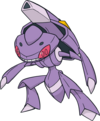 Bug Steel |
Shock Drive Genesect File:649Genesect S Dream.png Bug Steel |
Burn Drive Genesect File:649Genesect B Dream.png Bug Steel |
Chill Drive Genesect File:649Genesect C Dream.png Bug Steel |
Douse Drive Genesect File:649Genesect D Dream.png Bug Steel |
Greninja
- Ash-Greninja redirects here. For the Greninja that belonged to Ash Ketchum, see Ash's Greninja.
In the XY&Z arc of the anime's XY series, Ash's Greninja gained the ability to transform into a stronger form known as "Ash-Greninja" through an occurrence known as the Bond Phenomenon. In the games, a Greninja with the Ability Battle Bond will transform into Ash-Greninja after it causes an opponent to faint. In this form, the move Water Shuriken will become more powerful and always hit 3 times. Greninja will stay in this form until the end of battle or it faints. A Greninja with Battle Bond can be transferred to Pokémon Sun and Moon from the Special Demo Version.
Greninja with the Ability Battle Bond is always male and cannot breed.
|
| ||||||||||||||||||||||||||||||||||||||||||||||||||||||||||||||||||||||||
Vivillon
Vivillon has 18 different distinct patterns depending on the set geographic location of the Nintendo 3DS system on which the Scatterbug was generated (for Eggs, this means the game in which the Egg was created). This form cannot be changed. The pattern of Vivillon encountered within a game is set when the save file is created.
Bred Scatterbug will evolve into Vivillon with the same pattern as that of the breeding player's game, regardless of its parents.
Archipelago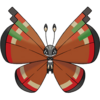 Bug Flying |
Continental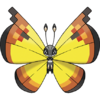 Bug Flying |
Elegant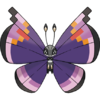 Bug Flying |
Garden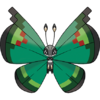 Bug Flying |
High Plains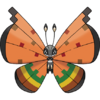 Bug Flying |
Icy Snow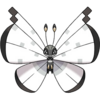 Bug Flying |
Jungle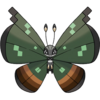 Bug Flying |
Marine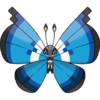 Bug Flying |
Meadow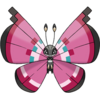 Bug Flying |
Modern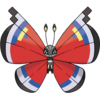 Bug Flying |
Monsoon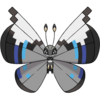 Bug Flying |
Ocean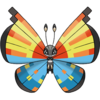 Bug Flying |
Polar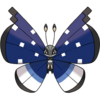 Bug Flying |
River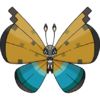 Bug Flying |
Sandstorm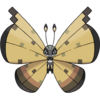 Bug Flying |
Savanna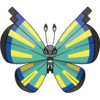 Bug Flying |
Sun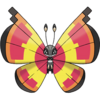 Bug Flying |
Tundra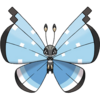 Bug Flying |
Note that Vivillon's pattern depends on the set geographic location of the Nintendo 3DS system when the save file was created. Locations within a country can have a different form than merely selecting a country without setting a specific location.
- Archipelago Pattern Vivillon can be found in Puerto Rico, Anguilla, the Dominican Republic and the Yucatán region of Mexico.
- Continental Pattern Vivillon can be found in Denmark, Germany and South Korea.
- Elegant Pattern Vivillon is found in most areas of Japan.
- Garden Pattern Vivillon can be found in the United Kingdom and New Zealand.
- High Plains Pattern Vivillon is found in the Western United States, although some players in Colorado report finding the Continental Pattern instead. The High Plains Pattern also appears in the British Columbia province of Canada.
- Icy Snow Pattern Vivillon has been reported in far northern regions of Norway and Russia, as well as Canada's northwestern and Yukon territory.
- Jungle Pattern Vivillon has been reported in Malaysia, Columbia, and Singapore.
- Marine Pattern Vivillon has been reported in large areas of Spain, Portugal, and Italy.
- Meadow Pattern Vivillon is known to be found in large sections of France and in Catalonia (Spain).
- Modern Pattern Vivillon has been found in central and southeastern United States.
- Monsoon Pattern Vivillon is known to come from India, Hong Kong, Okinawa, and Taiwan.
- Ocean Pattern Vivillon comes from Hawaii and Réunion.
- Polar Pattern Vivillon is known to come from Alaska, the northeastern United States, and large sections of Canada. Swedish players report finding Polar Pattern Vivillon as well.
- River Pattern Vivillon has been found in most regions of Australia, the Canary Islands (Spain) and several African countries.
- Sandstorm Pattern Vivillon is found throughout the Middle East.
- Savanna Pattern Vivillon is known to come from Brazil, Paraguay and Bolivia.
- Sun Pattern Vivillon has been reported throughout Latin America and the Northern Territory of Australia.
- Tundra Pattern Vivillon has been found in Hokkaido, Norway, and Iceland.
There are also two event-exclusive patterns, the Poké Ball Pattern and the Fancy Pattern. The Poké Ball Pattern resembles a standard Poké Ball, and was first distributed in Paris, France to promote the temporary Pokémon Center store. The Fancy Pattern was distributed via the Nintendo Network from July 8 to 31, 2014 to celebrate the GTS's 100 millionth Pokémon trade.
Poké Ball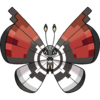 Bug Flying |
Fancy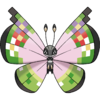 Bug Flying |
Flabébé, Floette, and Florges
Flabébé, Floette, and Florges can hold five different-colored flowers: red, yellow, orange, blue, and white. The flower color is maintained through evolution and cannot be changed. In Pokémon X and Y, if a Pokémon in this evolutionary family is encountered in a flower patch, the color of the flower it holds will depend on the color of that flower patch.
Bred Flabébé have the same color flower as their mother, or the same form as the Flabébé, Floette, and Florges parent if bred with Ditto.
Since only Blue Flower, Red Flower, and Yellow Flower Floette can appear in the Friend Safari, only these forms of Flabébé, Floette and Florges can have their Hidden Ability Symbiosis.
Red Flower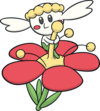 Fairy 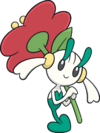 Fairy  Fairy |
Yellow Flower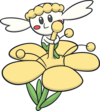 Fairy 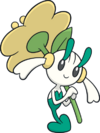 Fairy  Fairy |
Orange Flower Fairy 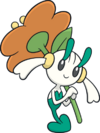 Fairy  Fairy |
Blue Flower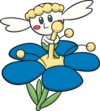 Fairy 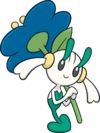 Fairy  Fairy |
White Flower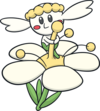 Fairy 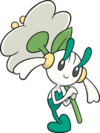 Fairy  Fairy |
In the storyline of Pokémon X and Y, there is also a unique Floette who AZ befriended 3,000 years ago. The flower it wields has a different design than normal, resembling the structure of the ancient ultimate weapon constructed by AZ; the flower also has a blue, red, and white color instead of green, yellow, and white, reflecting the colors of the French tricolor. The Generation VI and VII games include unused data for a trainable unique Floette. Unlike the other forms, it can learn the move Light of Ruin, and is the only Pokémon able to do so.
| Spoilers end here. |
|---|
Furfrou
Furfrou can be groomed into one of ten different trims. These trims will only last five days after the player has groomed the Pokémon. They are also lost if the player deposits Furfrou at the Pokémon Day Care or, prior to Generation VII, in the PC.
Furfrou can be groomed at Friseur Furfrou in Lumiose City, at the Pokémon Fan Club in Slateport City or by a Punk Girl at Malie City's salon. At these locations, grooming costs $500. At Friseur Furfrou, the player cannot initially select from all of the trims, with trims being unlocked gradually as the player becomes more stylish.
Prior to Pokémon Omega Ruby and Alpha Sapphire, Furfrou's trims are not registered in the Pokédex.
Natural Form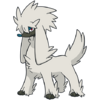 Normal |
Heart Trim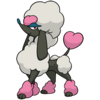 Normal |
Star Trim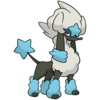 Normal |
Diamond Trim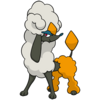 Normal |
Debutante Trim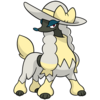 Normal |
Matron Trim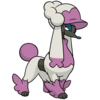 Normal |
Dandy Trim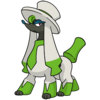 Normal |
La Reine Trim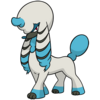 Normal |
Kabuki Trim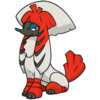 Normal |
Pharaoh Trim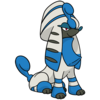 Normal |
Aegislash
Aegislash, due to its Ability Stance Change, can change forms in battle depending on the move it uses. Initially in Shield Forme, using a damaging move will change it to Blade Forme, while using King's Shield will change it back into Shield Forme. Outside of battle it is always in Shield Forme.
Shield Forme Aegislash has high Defense and Special Defense, while Blade Forme Aegislash has high Attack and Special Attack.
|
| ||||||||||||||||||||||||||||||||||||||||||||||||||||||||||||||||||||||||
Pumpkaboo and Gourgeist
Pumpkaboo and Gourgeist can be of Small, Average, Large and Super Size. Larger sizes of Pumpkaboo are rarer to encounter in the wild.
Different sizes have different base stats. For Pumpkaboo, with each increase in size, its base HP stat increases by 5 points while its base Speed stat decreases by 5 points. For Gourgeist, with each increase in size, its base HP stat increases by 10 points and its base Attack stat increases by 5 points while its base Speed stat decreases by 15 points. Consequently, the base stat total of a Pumpkaboo or Gourgeist does not vary with size.
Bred Pumpkaboo are the same size as their mother, or the same form as the Pumpkaboo or Gourgeist parent if bred with Ditto.
Wild Super Size Pumpkaboo will always hold a Miracle Seed, whereas other sizes will never hold an item in the wild. Super Size variants have different, lower pitched cries than the other forms.
Only Average Size and Super Size Pumpkaboo and Gourgeist can have their Hidden Ability Insomnia. Average Size can be obtained with its Hidden Ability from the Friend Safari; Super Size could be obtained with its Hidden Ability from events.
The different sizes of Pumpkaboo and Gourgeist do not use different menu sprites.
|
|
|
| ||||||||||||||||||||||||||||||||||||||||||||||||||||||||||||||||||||||||||||||||||||||||||||||||||||||||||||||||||||||||||||||||||||||||||||||||
|
|
|
| ||||||||||||||||||||||||||||||||||||||||||||||||||||||||||||||||||||||||||||||||||||||||||||||||||||||||||||||||||||||||||||||||||||||||||||||||
Xerneas
Xerneas has two forms: Neutral Mode and Active Mode. There is no gameplay difference between them; Xerneas appears in Active Mode in battle, and appears in Neutral Mode in situations outside of battle, such as cutscenes, the Pokédex, the Pokémon screen, and Pokémon-Amie. According to the Pokédex, Xerneas shares everlasting life while it is in Active Mode.
Xerneas's horns and some highlights in its fur are light blue in Neutral Mode and light gold in Active Mode. In Active Mode, the protrusions on its horns as well as its back spots light up in several colors.
Neutral Mode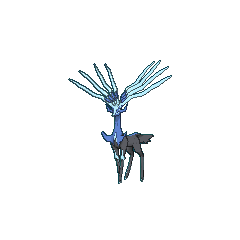 Fairy |
Active Mode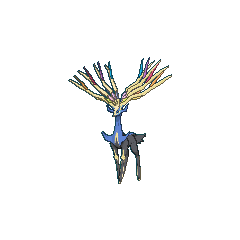 Fairy |
Zygarde
Zygarde has three different Formes, as well as two distinct constituent parts. The 50% Forme debuted in Pokémon X and Y. The other two Formes and both constituent parts debuted in the anime during the XY&Z arc of the XY series, and made their core series debut in Pokémon Sun and Moon.
A Zygarde Cell is a single cell of Zygarde. They can be found scattered throughout the region. They do not have thoughts or will, and can communicate with Zygarde Cores via telepathy. They are incapable of performing moves.
A Zygarde Core is a "brain" of Zygarde. They can communicate with Zygarde Cells and other Cores via telepathy. They take action when the region's ecosystem is threatened.
Zygarde 10% Forme is a Zygarde with 10% of its cells. It has razor-sharp teeth, and can reach speeds up to 60 mph (100 km/h). It can change into Complete Forme with its Ability Power Construct.
Zygarde 50% Forme is a Zygarde with 50% of its cells. It watches over and maintains the local ecosystem. It can change into Complete Forme with its Ability Power Construct.
In battle, a Zygarde with the Power Construct Ability will change into Complete Forme when its HP falls below half in a battle.
Zygarde Complete Forme is a Zygarde with 100% of its cells. Zygarde only takes on this form when the ecosystem is under threat and it believes Zygarde 50% Forme is unable to deal with it. Its power is said to exceed that of Xerneas and Yveltal.
In Pokémon Sun and Moon, the player can assemble Zygarde 10% Forme and Zygarde 50% Forme on Route 16 on Ula'ula Island out of Zygarde Cores and Cells, which can be collected in the overworld after obtaining the Zygarde Cube. A 10% Forme Zygarde with the Aura Break Ability can be assembled with 10 Cells and Cores, a 50% Forme Zygarde with Aura Break can be assembled with 50 Cells and Cores, and a 50% Forme Zygarde with the Power Construct Ability can be assembled with 100 Cells and Cores. A Zygarde with Aura Break cannot change Formes, but a Zygarde with Power Construct can be changed between 10% and 50% Forme using the Zygarde Cube.
Multiple Zygarde can be assembled at this location as long as the player possess enough Cores and Cells. 5 Cores and 95 Cells can be found in the overworld, but the player can accrue additional ones by separating any Zygarde with the Aura Break Ability. A Zygarde separated into Cells will be lost forever, and any Zygarde assembled from those Cells will be treated as a completely new Zygarde. A Zygarde with the Power Construct Ability cannot be separated.
Zygarde Cell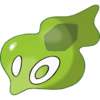
|
Zygarde Core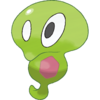
|
|
|
| ||||||||||||||||||||||||||||||||||||||||||||||||||||||||||||||||||||||||||||||||||||||||||||||||||||||||||||
Hoopa
Hoopa has two Formes it can change between, using the Prison Bottle to temporarily change to its more powerful Forme.
Normally, Hoopa Confined is the Forme taken by Hoopa, which is Psychic/Ghost. When exposed to a Prison Bottle, Hoopa transforms into Hoopa Unbound, which is Psychic/Dark. Hoopa Unbound was introduced in Pokémon Omega Ruby and Alpha Sapphire.
Hoopa Unbound will change back into Hoopa Confined after three days have passed since using the Prison Bottle. It will also revert if it is deposited at the Pokémon Day Care or, prior to Generation VII, in the PC.
The two forms have different stats, types, learnsets, and cries. Unlike other Pokémon with form differences, Hoopa has more than one category.
|
| ||||||||||||||||||||||||||||||||||||||||||||||||||||||||||||||||||||||||||||||||||||
| Lv. |  Hoopa Confined Psychic Ghost |
 Hoopa Unbound Psychic Dark |
|---|---|---|
| 1 | Hyperspace Hole | Hyperspace Fury |
| Trick | ||
| Destiny Bond | ||
| Ally Switch | ||
| Confusion | ||
| 6 | Astonish* | |
| 10 | Magic Coat | |
| 15 | Light Screen | |
| 19 | Psybeam | |
| 25 | Skill Swap | |
| 29 | Power Split | |
| Guard Split | ||
| 35 | Phantom Force | |
| 46 | Zen Headbutt | Knock Off |
| 50 | Wonder Room | |
| Trick Room | ||
| 55 | Shadow Ball | Dark Pulse |
| 68 | Nasty Plot | |
| 75 | Psychic | |
| 85 | Hyperspace Hole | Hyperspace Fury |
| Moves in bold are STAB. Moves in italics do no damage. | ||
Oricorio
Oricorio has four distinct styles. Depending on which island the player is on, the form that is encountered will be different. Baile Style is only found on Ula'ula Island, Pom-Pom Style on Melemele Island, Pa'u Style on Akala Island, and Sensu Style on Poni Island. Oricorio can manually change forms by sipping the Nectar of certain flowers. Each of Oricorio's four styles has a different primary type; Oricorio's signature move Revelation Dance changes type to match the user's primary type.
The forms have different types and cries.
Baile Style Fire Flying |
Pom-Pom Style Electric Flying |
Pa'u Style Psychic Flying |
Sensu Style Ghost Flying |
Lycanroc
Lycanroc has three forms: Midday Form, Midnight Form, and Dusk Form. In Pokémon Sun, Rockruff will only evolve into Midday Form Lycanroc, while in Pokémon Moon, Rockruff will only evolve into Midnight Form Lycanroc. Both Midday Form and Midnight Form can be caught in the wild in both Pokémon Sun and Pokémon Moon. Dusk Form will appear in Pokémon Ultra Sun and Ultra Moon; only special event-exclusive Rockruff can evolve into Dusk Form Lycanroc.
Lycanroc's Midday and Midnight Forms have different stats, Abilities, learnsets, and cries.
|
|
| ||||||||||||||||||||||||||||||||||||||||||||||||||||||||||||||||||||||||||||||||||||||||||||||||||||||||||||||||||||||||||||||
| Lv. |  Midday Form Rock |
 Midnight Form Rock |
|---|---|---|
| 1 | Accelerock | Counter |
| 1 | Quick Guard | Reversal |
| 1 | Quick Attack | Taunt |
| 1 | Tackle | |
| 1 | Leer | |
| 1 | Sand Attack | |
| 1 | Bite | |
| Evo. | Accelerock | Counter |
| 4 | Sand Attack | |
| 7 | Bite | |
| 12 | Howl | |
| 15 | Rock Throw | |
| 18 | Odor Sleuth | |
| 23 | Rock Tomb | |
| 26 | Roar | |
| 26 | Stealth Rock | |
| 34 | Rock Slide | |
| 37 | Scary Face | |
| 40 | Crunch | |
| 45 | Rock Climb | |
| 48 | Stone Edge | |
| Moves in bold are STAB. Moves in italics do no damage. | ||
Wishiwashi
Wishiwashi can change forms using its Schooling Ability if it is at least level 20. It will change from Solo Form to School Form at the start of a battle or at the end of a turn if its HP is above 25% of its maximum HP. In School Form, Wishiwashi's appearance changes from a small fish into a larger fish consisting of multiple smaller fish. It will change back to Solo Form if its HP is below 25% of its maximum HP at the end of a turn.
The two forms have different stats and cries.
|
| ||||||||||||||||||||||||||||||||||||||||||||||||||||||||||||||||||||||||
Silvally
Silvally has eighteen different forms, which correspond to the eighteen types. Silvally's type and appearance will change depending on its held Memory.
Normal 
|
Fighting 
|
Flying 
|
Poison 
|
Ground 
|
Rock 
|
Bug 
|
Ghost 
|
Steel 
|
Fire 
|
Water 
|
Grass 
|
Electric 
|
Psychic 
|
Ice 
|
Dragon 
|
Dark 
|
Fairy 
|
Minior
Minior has two forms that it changes between with its Ability, Shields Down. It will change from Core Form to Meteor Form at the start of a battle or at the end of a turn if its HP is above 50% of its maximum HP. If its HP falls below 50% of its maximum HP, its shell breaks and it changes back to Core Form at the end of that turn. Outside of battle, Minior is always in Core Form. However, wild Minior are always encountered in Meteor Form.
Meteor Form and Core Form have different stats. Due to its Ability Shields Down, Meteor Form Minior cannot be afflicted by status conditions.
A Minior's Core Form can be one of seven different colors. Bred Minior will always have the same Core color as their parent.
|
| ||||||||||||||||||||||||||||||||||||||||||||||||||||||||||||||||||||||||
Red Core Rock Flying |
Orange Core Rock Flying |
Yellow Core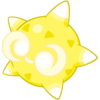 Rock Flying |
Green Core Rock Flying |
Blue Core Rock Flying |
Indigo Core Rock Flying |
Violet Core Rock Flying |
Mimikyu
Mimikyu has two forms called Disguised Form and Busted Form. When a Mimikyu in Disguised Form that has the Disguise Ability is hit by a damaging attack, it does not take damage and instead transforms into Busted Form. In Busted Form, its disguise slumps to the side and it can be damaged by normal means. Mimikyu will stay in Busted Form until either it faints or the battle ends.
Disguised Form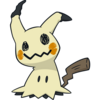 Ghost Fairy |
Busted Form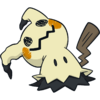 Ghost Fairy |
Solgaleo
Solgaleo has an additional form called Radiant Sun phase. It assumes this form when using its powers, shining brighter than normal. When Solgaleo uses its signature move, Sunsteel Strike, it will also enter its Radiant Sun phase for the duration of the move.
Solgaleo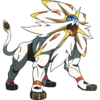 Psychic Steel |
Radiant Sun phase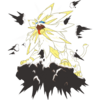 Psychic Steel |
Lunala
Lunala has an additional form called Full Moon phase. It assumes this form when using its powers, shining brighter than normal. When Lunala uses its signature move, Moongeist Beam, it will also enter its Full Moon phase for the duration of the move.
Lunala Psychic Ghost |
Full Moon phase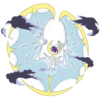 Psychic Ghost |
Necrozma
Necrozma has two additional forms called Dusk Mane and Dawn Wings, in which it has absorbed Solgaleo and Lunala, respectively, introduced in Pokémon Ultra Sun and Ultra Moon.
Dusk Mane Necrozma can learn the moves Sunsteel Strike and is able to use Solgaleo's exclusive Z-Move Searing Sunraze Smash. Its Attack is higher than Solgaleo's base 137 Attack.
Dawn Wings Necrozma can learn the moves Moongeist Beam and is able to use Lunala's exclusive Z-Move Menacing Moonraze Maelstrom. Its Special Attack is higher than Lunala's base 137 Special Attack.
|
|
| ||||||||||||||||||||||||||||||||||||||||||||||||||||||||||||||||||||||||||||||||||||||||||||||||||||||||||||
Magearna
Magearna has an alternate form called Original Color Magearna. The only difference between Magearna's forms is aesthetic: the Original Color form is red and gold. The Original Color form cannot be legitimately obtained, and has only appeared in an offical capacity in the anime movie, Volcanion and the Mechanical Marvel.
Magearna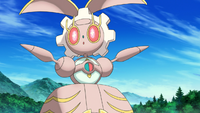 Steel Fairy |
Original Color Magearna Steel Fairy |
In other languages
|
Form
|
Forme
| ||||||||||||||||||||||||||||||||||||||||||||||||||||||||||||||||||
Specific forms
| # | MS | Pokémon | |||||||||||
|---|---|---|---|---|---|---|---|---|---|---|---|---|---|
| 025 |  |
Pikachu | Cosplay Pikachu | おきがえ・ピカチュウ | Okigae Pikachu | Pikachu Cosplayeur | Cosplay-Pikachu | Pikachu Cosplay | Pikachu Coqueta | 옷갈아입기 피카츄 | Otgaraipgi Pikachu | — | — |
| 025 |  |
Pikachu | Pikachu Rock Star | ハードロック・ピカチュウ | Hard Rock Pikachu | Pikachu Rockeur | Rocker-Pikachu | Pikachu rockstar | Pikachu Roquera | 하드록 피카츄 | Hard Rock Pikachu | 重搖滾皮卡丘 / 重摇滚皮卡丘 | Zhòngyáogǔn Píkǎqiū / Chúhngyìuhgwán Pikachu |
| 025 |  |
Pikachu | Pikachu Belle | マダム・ピカチュウ | Madame Pikachu | Pikachu Lady | Damen-Pikachu | Pikachu damigella | Pikachu Aristócrata | 마담 피카츄 | Madame Pikachu | 貴婦皮卡丘 / 贵妇皮卡丘 | Guìfù Píkǎqiū / Gwaifúh Pikachu |
| 025 |  |
Pikachu | Pikachu Pop Star | アイドル・ピカチュウ | Idol Pikachu | Pikachu Star | Star-Pikachu | Pikachu confetto | Pikachu Superstar | 아이돌 피카츄 | Idol Pikachu | 偶像皮卡丘 | Ǒuxiàng Píkǎqiū / Ngáuhjeuhng Pikachu |
| 025 |  |
Pikachu | Pikachu, Ph. D | ドクター・ピカチュウ | Doctor Pikachu | Pikachu Docteur | Professoren-Pikachu | Pikachu scienziata | Pikachu Erudita | 닥터 피카츄 | Doctor Pikachu | 博士皮卡丘 | Bóshì Píkǎqiū / Boksih Pikachu |
| 025 |  |
Pikachu | Pikachu Libre | マスクド・ピカチュウ | Masked Pikachu | Pikachu Catcheur | Wrestler-Pikachu | Pikachu wrestler | Pikachu Enmascarada | 마스크드 피카츄 | Masked Pikachu | 蒙面・皮卡丘 | Méngmiàn Píkǎqiū / Mùhngmihn Pikachu |
| 025 |  |
Pikachu | Original Cap | オリジナルキャップ | Original Cap | Casquette Originale | Original-Kappe | Berretto Originale | Gorra Original | 오리지널캡 | Original Cap | 初始帽子 | Chūshǐ Màozi / Chōchí Mouhjí |
| 025 |  |
Pikachu | Hoenn Cap | ホウエンキャップ | Hoenn Cap | Casquette de Hoenn | Hoenn-Kappe | Berretto Hoenn | Gorra Hoenn | 호연캡 | Hoenn Cap | 豐緣帽子 / 丰缘帽子 | Fēngyuán Màozi / Fūngyùhn Mouhjí |
| 025 |  |
Pikachu | Sinnoh Cap | シンオウキャップ | Sinnoh Cap | Casquette de Sinnoh | Sinnoh-Kappe | Berretto Sinnoh | Gorra Sinnoh | 신오캡 | Sinnoh Cap | 神奧帽子 / 神奥帽子 | Shén'aò Màozi / Sàhn'ou Mouhjí |
| 025 |  |
Pikachu | Unova Cap | イッシュキャップ | Isshu Cap | Casquette d'Unys | Einall-Kappe | Berretto Unima | Gorra Teselia | 하나캡 | Hana Cap | 合眾帽子 / 合众帽子 | Hézhòng Màozi / Hapjung Mouhjí |
| 025 |  |
Pikachu | Kalos Cap | カロスキャップ | Kalos Cap | Casquette de Kalos | Kalos-Kappe | Berretto Kalos | Gorra Kalos | 칼로스캡 | Kalos Cap | 卡洛斯帽子 | Kǎluòsī Màozi / Kāloksī Mouhjí |
| 025 |  |
Pikachu | Alola Cap | アローラキャップ | Alola Cap | Casquette d'Alola | Alola-Kappe | Berretto Alola | Gorra Alola | 알로라캡 | Alola Cap | 阿羅拉帽子 / 阿罗拉帽子 | Āluólā Màozi / Alòhlāai Mouhjí |
| 025 |  |
Pikachu | — | キミにきめたキャップ | Kimi ni Kimeta Cap | — | — | — | — | — | — | — | — |
| 172 | Pichu | Pichu | Spiky-eared Pichu | ギザみみピチュー | Gizamimi Pichu | Pichu Troizépi | Strubbelohr-Pichu | Pichu Spunzorek | Pichu Picoreja | 삐쭉귀 피츄 | Ppijjukgwi Pichu | 刺刺耳皮丘 | Cìcì'ěr Píqiū |
| 201 |  |
Unown | One form | あるすがた | Aru sugata | Forme Unique | Einform | Forma Vaga | Una forma | 형태별 모습 | Hyeongtaebyeol moseup | 某種樣子 / 某种样子 | Mǒuzhǒng Yàngzi / Máuhjúng Yeuhngjí |
| 351 |  |
Castform | Normal | ポワルンのすがた | Powalen no Sugata | Forme de Morphéo | Formeo | Forma Castform | Forma de Castform | 캐스퐁의 모습 | Kaeseupong-ui Moseup | 飄浮泡泡的樣子 / 飘浮泡泡的样子 | Piāofúpàopào-de Yàngzi / Pīufàuhpóuhpóuh-dīk Yeuhngjí |
| 351 |  |
Castform | Sunny Form | たいようのすがた | Taiyō no Sugata | Forme Solaire | Sonnenform | Forma Sole | Forma Sol | 태양의 모습 | Taeyang-ui Moseup | 太陽的樣子 / 太阳的样子 | Tàiyáng-de Yàngzi / Taaiyèuhng-dīk Yeuhngjí |
| 351 |  |
Castform | Rainy Form | あまみずのすがた | Amamizu no Sugata | Forme Eau de Pluie | Regenform | Forma Pioggia | Forma Lluvia | 빗방울의 모습 | Bitbangu-rui Moseup | 雨水的樣子 / 雨水的样子 | Yǔshuǐ-de Yàngzi / Yúhséui-dīk Yeuhngjí |
| 351 |  |
Castform | Snowy Form | ゆきぐものすがた | Yukigumo no Sugata | Forme Blizzard | Schneeform | Forma Nuvola di Neve | Forma Nieve | 설운의 모습 | Seorun-ui Moseup | 雪雲的樣子 / 雪云的样子 | Xuěyún-de Yàngzi / Syutwàhn-dīk Yeuhngjí |
| 386 |  |
Deoxys | Normal Forme | ノーマルフォルム | Normal Forme | Forme Normale | Normalform | Forma Normale | Forma Normal | 노말폼 | Normal Forme | 普通形態 / 普通形态 | Pǔtōng Xíngtài / Póutūng Yìhngtaai |
| 386 |  |
Deoxys | Attack Forme | アタックフォルム | Attack Forme | Forme Attaque | Angriffsform | Forma Attacco | Forma Ataque | 어택폼 | Attack Forme | 攻擊形態 / 攻击形态 | Gōngjí Xíngtài / Gōngjī Xíngtài / Gūnggīk Yìhngtaai |
| 386 |  |
Deoxys | Defense Forme | ディフェンスフォルム | Defense Forme | Forme Défense | Verteidigungsform | Forma Difesa | Forma Defensa | 디펜스폼 | Defense Forme | 防禦形態 / 防御形态 | Fángyù Xíngtài / Fòhngyuh Yìhngtaai |
| 386 |  |
Deoxys | Speed Forme | スピードフォルム | Speed Forme | Forme Vitesse | Initiativeform | Forma Velocità | Forma Velocidad | 스피드폼 | Speed Forme | 速度形態 / 速度形态 | Sùdù Xíngtài / Chūkdouh Yìhngtaai |
| 412 |  |
Burmy | Plant Cloak | くさきのミノ | Kusaki no Mino | Cape Plante | Pflanzenumhang | Manto Pianta | Tronco Planta | 초목도롱 | Chomong Dorong | 草木蓑衣 | Cǎomù Suōyī / Chóumuhk Sōyī |
| 412 |  |
Burmy | Sandy Cloak | すなちのミノ | Sunachi no Mino | Cape Sable | Sandumhang | Manto Sabbia | Tronco Arena | 모래땅도롱 | Moraettang Dorong | 砂土蓑衣 | Shātǔ Suōyī / Sātóu Sōyī |
| 412 |  |
Burmy | Trash Cloak | ゴミのミノ | Gomi no Mino | Cape Déchet | Lumpenumhang | Manto Scarti | Tronco Basura | 슈레도롱 | Syure Dorong | 垃圾蓑衣 | Lèsè Suōyī / Laahpsaap Sōyī |
| 413 |  |
Wormadam | Plant Cloak | くさきのミノ | Kusaki no Mino | Cape Plante | Pflanzenumhang | Manto Pianta | Tronco Planta | 초목도롱 | Chomong Dorong | 草木蓑衣 | Cǎomù Suōyī / Chóumuhk Sōyī |
| 413 |  |
Wormadam | Sandy Cloak | すなちのミノ | Sunachi no Mino | Cape Sable | Sandumhang | Manto Sabbia | Tronco Arena | 모래땅도롱 | Moraettang Dorong | 砂土蓑衣 | Shātǔ Suōyī / Sātóu Sōyī |
| 413 |  |
Wormadam | Trash Cloak | ゴミのミノ | Gomi no Mino | Cape Déchet | Lumpenumhang | Manto Scarti | Tronco Basura | 슈레도롱 | Syure Dorong | 垃圾蓑衣 | Lèsè Suōyī / Laahpsaap Sōyī |
| 421 |  |
Cherrim | Overcast Form | ネガフォルム | Nega Forme | Temps Couvert | Wolkenform | Forma Nuvola | Forma Encapotado | 네거폼 | Nega Forme | 陰天形態 / 阴天形态 | Yīntiān Xíngtài / Yāmtīn Yìhngtaai |
| 421 |  |
Cherrim | Sunshine Form | ポジフォルム | Posi Forme | Temps Ensoleillé | Sonnenform | Forma Splendore | Forma Soleado | 포지폼 | Posi Forme | 晴天形態 / 晴天形态 | Qíngtiān Xíngtài / Chìhngtīn Yìhngtaai |
| 422 |  |
Shellos | West Sea | にしのうみ | Nishi no Umi | Mer Occident | Westliches Meer | Mare Ovest | Mar Oeste | 서쪽바다 | Seo-jjong Bada | 西海 | Xihǎi / Sāihói |
| 422 |  |
Shellos | East Sea | ひがしのうみ | Higashi no Umi | Mer Orient | Östliches Meer | Mare Est | Mar Este | 동쪽바다 | Dong-jjong Bada | 東海 / 东海 | Dōnghǎi / Dūnghói |
| 423 |  |
Gastrodon | West Sea | にしのうみ | Nishi no Umi | Mer Occident | Westliches Meer | Mare Ovest | Mar Oeste | 서쪽바다 | Seo-jjong Bada | 西海 | Xihǎi / Sāihói |
| 423 |  |
Gastrodon | East Sea | ひがしのうみ | Higashi no Umi | Mer Orient | Östliches Meer | Mare Est | Mar Este | 동쪽바다 | Dong-jjong Bada | 東海 / 东海 | Dōnghǎi / Dūnghói |
| 479 |  |
Rotom | Rotom | ロトムのすがた | Rotom no Sugata | Forme de Motisma | Rotom | Forma Rotom | Forma de Rotom | 로토무의 모습 | Rotomu-ui Moseup | 洛托姆的樣子 / 洛托姆的样子 | Luòtuōmǔ-de Yàngzi / Loktokmóuh-dīk Yeuhngjí |
| 479 |  |
Rotom | Heat Rotom | ヒートロトム | Heat Rotom | Motisma Chaleur | Hitze-Rotom | Rotom Calore | Rotom Calor | 히트로토무 | Heat Rotomu | 加熱洛托姆 / 加热洛托姆 | Jiārè Luòtuōmǔ / Gāyiht Loktokmóuh |
| 479 |  |
Rotom | Wash Rotom | ウォッシュロトム | Wash Rotom | Motisma Lavage | Wasch-Rotom | Rotom Lavaggio | Rotom Lavado | 워시로토무 | Wash Rotomu | 清洗洛托姆 | Qīngxǐ Luòtuōmǔ / Chīngsái Loktokmóuh |
| 479 |  |
Rotom | Frost Rotom | フロストロトム | Frost Rotom | Motisma Froid | Frost-Rotom | Rotom Gelo | Rotom Frío | 프로스트로토무 | Frost Rotomu | 結冰洛托姆 / 结冰洛托姆 | Jiébīng Luòtuōmǔ / Gitbīng Loktokmóuh |
| 479 |  |
Rotom | Fan Rotom | スピンロトム | Spin Rotom | Motisma Hélice | Wirbel-Rotom | Rotom Vortice | Rotom Ventilador | 스핀로토무 | Spin Rotomu | 旋轉洛托姆 / 旋转洛托姆 | Xuánzhuǎn Luòtuōmǔ / Syùhnjyún Loktokmóuh |
| 479 |  |
Rotom | Mow Rotom | カットロトム | Cut Rotom | Motisma Tonte | Schneid-Rotom | Rotom Taglio | Rotom Corte | 커트로토무 | Cut Rotomu | 切割洛托姆 | Qiēgē Luòtuōmǔ / Chitgot Loktokmóuh |
| 487 |  |
Giratina | Altered Forme | アナザーフォルム | Another Forme | Forme Alternative | Wandelform | Forma Alterata | Forma Modificada | 어나더폼 | Another Forme | 別種形態 / 别种形态 | Biézhǒng Xíngtài / Bihtjúng Yìhngtaai |
| 487 |  |
Giratina | Origin Forme | オリジンフォルム | Origin Forme | Forme Originelle | Urform | Forma Originale | Forma Origen | 오리진폼 | Origin Forme | 起源形態 / 起源形态 | Qǐyuán Xíngtài / Héiyùhn Yìhngtaai |
| 492 |  |
Shaymin | Land Forme | ランドフォルム | Land Forme | Forme Terrestre | Landform | Forma Terra | Forma Tierra | 랜드폼 | Land Forme | 陸上形態 / 陆上形态 | Lùshàng Xíngtài / Luhkseuhng Yìhngtaai |
| 492 |  |
Shaymin | Sky Forme | スカイフォルム | Sky Forme | Forme Céleste | Zenitform | Forma Cielo | Forma Cielo | 스카이폼 | Sky Forme | 天空形態 / 天空形态 | Tiānkōng Xíngtài / Tīnhūng Yìhngtaai |
| 493 |  |
Arceus | Arceus | アルセウスのすがた | Arceus no Sugata | Forme de Arceus | Arceus | Forma di Arceus | Forma de Arceus | 아르세우스의 모습 | Arceus-ui Moseup | 阿爾宙斯的樣子 / 阿尔宙斯的样子 | Ā'ěrzhòusī-de Yàngzi / Ayíhjauhsī-dīk Yeuhngjí |
| 550 |  |
Basculin | Red-Striped Form | あかすじのすがた | Aka-suji no Sugata | Motif Rouge | Rotlinige Form | Forma Linearossa | Forma Raya Roja | 적색근의 모습 | Jeoksaenggeun-ui Moseup | 紅條紋的樣子 / 红条纹的样子 | Hóngtiáowén-de Yàngzi / Hùhngtìuhmàhn-dīk Yeuhngjí |
| 550 |  |
Basculin | Blue-Striped Form | あおすじのすがた | Ao-suji no Sugata | Motif Bleu | Blaulinige Form | Forma Lineablu | Forma Raya Azul | 청색근의 모습 | Cheongsaenggeun-ui Moseup | 藍條紋的樣子 / 蓝条纹的样子 | Lántiáowén-de Yàngzi / Làahmtìuhmàhn-dīk Yeuhngjí |
| 555 |  |
Darmanitan | Standard Mode | ノーマルモード | Normal Mode | Mode Normal | Normalmodus | Forma Normalità | Modo Normal | 노말모드 | Normal Mode | 普通模式 | Pǔtōng Móshì / Póutūng Mòuhsīk |
| 555 |  |
Darmanitan | Zen Mode | ダルマモード | Daruma Mode | Mode Transe | Trance-Modus | Stato Zen | Modo Daruma | 달마모드 | Daruma Mode | 達摩模式 / 达摩模式 | Dámó Móshì / Daahtmō Mòuhsīk |
| 585 |  |
Deerling | Spring Form | はるのすがた | Haru no Sugata | Forme Printemps | Frühlingsform | Forma Primavera | Forma Primavera | 봄의 모습 | Bom-ui Moseup | 春天的樣子 / 春天的样子 | Chūntiān-de Yàngzi / Chēuntīn-dīk Yeuhngjí |
| 585 |  |
Deerling | Summer Form | なつのすがた | Natsu no Sugata | Forme Été | Sommerform | Forma Estate | Forma Verano | 여름의 모습 | Yeoreum-ui Moseup | 夏天的樣子 / 夏天的样子 | Xiàtiān-de Yàngzi / Hahtīn-dīk Yeuhngjí |
| 585 |  |
Deerling | Autumn Form | あきのすがた | Aki no Sugata | Forme Automne | Herbstform | Forma Autunno | Forma Otoño | 가을의 모습 | Gaeu-rui Moseup | 秋天的樣子 / 秋天的样子 | Qiūtiān-de Yàngzi / Chāutīn-dīk Yeuhngjí |
| 585 |  |
Deerling | Winter Form | ふゆのすがた | Fuyu no Sugata | Forme Hiver | Winterform | Forma Inverno | Forma Invierno | 겨울의 모습 | Gyeou-rui Moseup | 冬天的樣子 / 冬天的样子 | Dōngtiān-de Yàngzi / Dūngtīn-dīk Yeuhngjí |
| 586 |  |
Sawsbuck | Spring Form | はるのすがた | Haru no Sugata | Forme Printemps | Frühlingsform | Forma Primavera | Forma Primavera | 봄의 모습 | Bom-ui Moseup | 春天的樣子 / 春天的样子 | Chūntiān-de Yàngzi / Chēuntīn-dīk Yeuhngjí |
| 586 |  |
Sawsbuck | Summer Form | なつのすがた | Natsu no Sugata | Forme Été | Sommerform | Forma Estate | Forma Verano | 여름의 모습 | Yeoreum-ui Moseup | 夏天的樣子 / 夏天的样子 | Xiàtiān-de Yàngzi / Hahtīn-dīk Yeuhngjí |
| 586 |  |
Sawsbuck | Autumn Form | あきのすがた | Aki no Sugata | Forme Automne | Herbstform | Forma Autunno | Forma Otoño | 가을의 모습 | Gaeu-rui Moseup | 秋天的樣子 / 秋天的样子 | Qiūtiān-de Yàngzi / Chāutīn-dīk Yeuhngjí |
| 586 |  |
Sawsbuck | Winter Form | ふゆのすがた | Fuyu no Sugata | Forme Hiver | Winterform | Forma Inverno | Forma Invierno | 겨울의 모습 | Gyeou-rui Moseup | 冬天的樣子 / 冬天的样子 | Dōngtiān-de Yàngzi / Dūngtīn-dīk Yeuhngjí |
| 641 |  |
Tornadus | Incarnate Forme | けしんフォルム | Keshin Forme | Forme Avatar | Inkarnationsform | Forma Incarnazione | Forma Avatar | 화신폼 | Hwasin Forme | 化身形態 / 化身形态 | Huàshēn Xíngtài / Fasān Yìhngtaai |
| 641 |  |
Tornadus | Therian Forme | れいじゅうフォルム | Reijū Forme | Forme Totémique | Tiergeistform | Forma Totem | Forma Tótem | 영물폼 | Yeongmul Forme | 靈獸形態 / 灵兽形态 | Língshòu Xíngtài / Lìhngsau Yìhngtaai |
| 642 |  |
Thundurus | Incarnate Forme | けしんフォルム | Keshin Forme | Forme Avatar | Inkarnationsform | Forma Incarnazione | Forma Avatar | 화신폼 | Hwasin Forme | 化身形態 / 化身形态 | Huàshēn Xíngtài / Fasān Yìhngtaai |
| 642 |  |
Thundurus | Therian Forme | れいじゅうフォルム | Reijū Forme | Forme Totémique | Tiergeistform | Forma Totem | Forma Tótem | 영물폼 | Yeongmul Forme | 靈獸形態 / 灵兽形态 | Língshòu Xíngtài / Lìhngsau Yìhngtaai |
| 645 |  |
Landorus | Incarnate Forme | けしんフォルム | Keshin Forme | Forme Avatar | Inkarnationsform | Forma Incarnazione | Forma Avatar | 화신폼 | Hwasin Forme | 化身形態 / 化身形态 | Huàshēn Xíngtài / Fasān Yìhngtaai |
| 645 |  |
Landorus | Therian Forme | れいじゅうフォルム | Reijū Forme | Forme Totémique | Tiergeistform | Forma Totem | Forma Tótem | 영물폼 | Yeongmul Forme | 靈獸形態 / 灵兽形态 | Língshòu Xíngtài / Lìhngsau Yìhngtaai |
| 646 |  |
Kyurem | Kyurem | キュレムのすがた | Kyurem no Sugata | Forme de Kyurem | Kyurem | Forma di Kyurem | Forma Kyurem | 큐레무의 모습 | Kyurem-ui Moseup | 酋雷姆的樣子 / 酋雷姆的样子 | Qiúléimǔ-de Xíngtài / Yàuhlèuihmóuh-dīk Yìhngtaai |
| 646 |  |
Kyurem | White Kyurem | ホワイトキュレム | White Kyurem | Kyurem Blanc | Weißes Kyurem | Kyurem Bianco | Kyurem Blanco | 화이트큐레무 | White Kyurem | 焰白酋雷姆 | Yànbái Qiúléimǔ / Yihmbaahk Yàuhlèuihmóuh |
| 646 |  |
Kyurem | Black Kyurem | ブラックキュレム | Black Kyurem | Kyurem Noir | Schwarzes Kyurem | Kyurem Nero | Kyurem Negro | 블랙큐레무 | Black Kyurem | 闇黑酋雷姆 / 暗黑酋雷姆 | Ànhēi Qiúléimǔ / Amhāk Yàuhlèuihmóuh |
| 647 |  |
Keldeo | Ordinary Form | いつものすがた | Itsumo no Sugata | Aspect Normal | Standardform | Forma Normale | Forma Habitual | 평상시 모습 | Pyeongsang-si Moseup | 平常的樣子 / 平常的样子 | Píngcháng-de Yàngzi / Pìhngsèuhng-dīk Yeuhngjí |
| 647 |  |
Keldeo | Resolute Form | かくごのすがた | Kakugo no Sugata | Aspect Décidé | Resolutform | Forma Risoluta | Forma Brío | 각오의 모습 | Gago-ui Moseup | 覺悟的樣子 / 觉悟的样子 | Juéwù-de Yàngzi / Gokngh-dīk Yeuhngjí |
| 648 |  |
Meloetta | Aria Forme | ボイスフォルム | Voice Forme | Forme Chant | Gesangsform | Forma Canto | Forma Lírica | 보이스폼 | Voice Forme | 歌聲形態 / 歌声形态 | Gēshēng Xíngtài / Gōsīng Yìhngtaai |
| 648 |  |
Meloetta | Pirouette Forme | ステップフォルム | Step Forme | Forme Danse | Tanzform | Forma Danza | Forma Danza | 스텝폼 | Step Forme | 舞步形態 / 舞步形态 | Wǔbù Xíngtài / Móuhbouh Yìhngtaai |
| 649 |  |
Genesect | Genesect | ゲノセクトのすがた | Genesect no Sugata | Forme de Genesect | Genesect | Forma di Genesect | Forma de Genesect | 게노세크트의 모습 | Genesect-ui Moseup | 蓋諾賽克特的樣子 / 盖诺赛克特的样子 | Gàinuòsàikètè-de Yàngzi / Koinohkchoihākdahk-dīk Yeuhngjí |
| 658 |  |
Greninja | Ash-Greninja | サトシゲッコウガ | Satoshi Gekkouga | Sachanobi | Ash-Quajutsu | Greninja Forma Ash | Greninja Ash | 지우개굴닌자 | Jiu Gaegulninja | 小智版甲賀忍蛙 / 小智版甲贺忍蛙 | Xiǎozhì-bǎn Jiǎhèrěnwā / Síuji-báan Gaaphohyánwā |
| 666 |  |
Vivillon | Icy Snow Pattern | ひょうせつのもよう | Hyōsetsu no Moyō | Motif Blizzard | Frostmuster | Motivo Nevi Perenni | Motivo Polar | 빙설의 모양 | Bingseol-ui Moyang | 冰雪花紋 / 冰雪花纹 | Bīngxuě Huāwén / Bīngsyut Fāmàhn |
| 666 |  |
Vivillon | Polar Pattern | ゆきぐにのもよう | Yukiguni no Moyō | Motif Banquise | Schneefeldmuster | Motivo Nordico | Motivo Taiga | 설국의 모양 | Seolgok-ui Moyang | 雪國花紋 / 雪国花纹 | Xuěguó Huāwén / Syutgwok Fāmàhn |
| 666 |  |
Vivillon | Tundra Pattern | せつげんのもよう | Setsugen no Moyō | Motif Glace | Flockenmuster | Motivo Manto di Neve | Motivo Tundra | 설원의 모양 | Seolwon-ui Moyang | 雪原花紋 / 雪原花纹 | Xuěyuán Huāwén / Syutyùhn Fāmàhn |
| 666 |  |
Vivillon | Continental Pattern | たいりくのもよう | Tairiku no Moyō | Motif Continent | Kontinentalmuster | Motivo Continentale | Motivo Continental | 대륙의 모양 | Taeryuk-ui Moyang | 大陸花紋 / 大陆花纹 | Dàlù Huāwén / Daaihluhk Fāmàhn |
| 666 |  |
Vivillon | Garden Pattern | ていえんのもよう | Teien no Moyō | Motif Verdure | Ziergartenmuster | Motivo Prato | Motivo Vergel | 정원의 모양 | Jeongweon-ui Moyang | 庭園花紋 / 庭园花纹 | Tíngyuán Huāwén / Tìhngyùhn Fāmàhn |
| 666 |  |
Vivillon | Elegant Pattern | みやびなもよう | Miyabi-na Moyō | Motif Monarchie | Prunkmuster | Motivo Eleganza | Motivo Oriental | 우아한 모양 | Ua-han Moyang | 高雅花紋 / 高雅花纹 | Gāoyǎ Huāwén / Gōu'ngáh Fāmàhn |
| 666 |  |
Vivillon | Meadow Pattern | はなぞののもよう | Hanazono no Moyō | Motif Floraison | Blumenmeermuster | Motivo Giardinfiore | Motivo Floral | 화원의 모양 | Hwawon Moyang | 花園花紋 / 花园花纹 | Huāyuán Huāwén / Fāyún Fāmàhn |
| 666 |  |
Vivillon | Modern Pattern | モダンなもよう | Modern na Moyō | Motif Métropole | Innovationsmuster | Motivo Trendy | Motivo Moderno | 모던한 모양 | Modern-han Moyang | 摩登花紋 / 摩登花纹 | Módēng Huāwén / Mōdāng Fāmàhn |
| 666 |  |
Vivillon | Marine Pattern | マリンのもよう | Marine no Moyō | Motif Rivage | Aquamarinmuster | Motivo Marino | Motivo Marino | 마린의 모양 | Marine-ui Moyang | 大海花紋 / 大海花纹 | Dàhǎi Huāwén / Daaihhói Fāmàhn |
| 666 |  |
Vivillon | Archipelago Pattern | ぐんとうのもよう | Guntō no Moyō | Motif Archipel | Archipelmuster | Motivo Arcipelago | Motivo Isleño | 군도의 모양 | Gundo-ui Moyang | 群島花紋 / 群岛花纹 | Qúndǎo Huāwén / Kwàhndóu Fāmàhn |
| 666 |  |
Vivillon | High Plains Pattern | こうやのもよう | Kōya no Moyō | Motif Sécheresse | Dürremuster | Motivo Deserto | Motivo Estepa | 황야의 모양 | Hwangya-ui Moyang | 荒野花紋 / 荒野花纹 | Huāngyě Huāwén / Fōngyéh Fāmàhn |
| 666 |  |
Vivillon | Sandstorm Pattern | さじんのもよう | Sajin no Moyō | Motif Sable | Sandmuster | Motivo Sabbia | Motivo Desierto | 사진의 모양 | Sajin-ui Moyang | 沙塵花紋 / 沙尘花纹 | Shāchén Huāwén / Sāchàhn Fāmàhn |
| 666 |  |
Vivillon | River Pattern | たいがのもよう | Taiga no Moyō | Motif Delta | Flussdeltamuster | Motivo Fluviale | Motivo Oasis | 대하의 모양 | Daeha-ui Moyang | 大河花紋 / 大河花纹 | Dàhé Huāwén / Daaihhòh Fāmàhn |
| 666 |  |
Vivillon | Monsoon Pattern | スコールのもよう | Squall no Moyō | Motif Cyclone | Monsunmuster | Motivo Pluviale | Motivo Monzón | 스콜의 모양 | Squall-ui Moyang | 驟雨花紋 / 骤雨花纹 | Zòuyǔ Huāwén / Zhòuyǔ Huāwén / Jaauhyúh Fāmàhn |
| 666 |  |
Vivillon | Savanna Pattern | サバンナのもよう | Savanna no Moyō | Motif Mangrove | Savannenmuster | Motivo Savana | Motivo Pantano | 사바나의 모양 | Savanna-ui Moyang | 熱帶草原花紋 / 热带草原花纹 | Rèdàicǎoyuán Huāwén / Yihtdaaichóuyùhn Fāmàhn |
| 666 |  |
Vivillon | Sun Pattern | たいようのもよう | Taiyō no Moyō | Motif Zénith | Sonnenmuster | Motivo Solare | Motivo Solar | 태양의 모양 | Taeyang-ui Moyang | 太陽花紋 / 太阳花纹 | Tàiyáng Huāwén / Taaiyèuhng Fāmàhn |
| 666 |  |
Vivillon | Ocean Pattern | オーシャンのもよう | Ocean no Moyō | Motif Soleil Levant | Ozeanmuster | Motivo Oceanico | Motivo Océano | 오션의 모양 | Ocean-ui Moyang | 大洋花紋 / 大洋花纹 | Dàyáng Huāwén / Daaihyèuhng Fāmàhn |
| 666 |  |
Vivillon | Jungle Pattern | ジャングルのもよう | Jungle no Moyō | Motif Jungle | Dschungelmuster | Motivo Giungla | Motivo Jungla | 정글의 모양 | Jungle-ui Moyang | 熱帶雨林花紋 / 热带雨林花纹 | Rèdàiyǔlín Huāwén / Yihtdaaiyúhlàhm Fāmàhn |
| 666 |  |
Vivillon | Fancy Pattern | ファンシーなもよう | Fancy na Moyō | Motif Fantaisie | Fantasiemuster | Motivo Sbarazzino | Motivo Fantasía | 팬시한 모양 | Fancy-han Moyang | 幻彩花紋 / 幻彩花纹 | Huànyǐng Huāwén / Waahnyíng Fāmàhn |
| 666 |  |
Vivillon | Poké Ball Pattern | ボールのもよう | Ball no Moyō | Motif Poké Ball | Pokéball-Muster | Motivo Poké Ball | Motivo Poké Ball | 볼의 모양 | Ball-ui Moyang | 球球花紋 / 球球花纹 | Qiúqiú Huāwén / Kàuhkàuh Fāmàhn |
| 669 |  |
Flabébé | Red Flower | あかいはな | Akai Hana | Fleur Rouge | Rotblütler | Fiore Rosso | Flor Roja | 빨간 꽃 | Ppalgan Kkot | 紅花 / 红花 | Hónghuā / Hùhngfā |
| 669 |  |
Flabébé | Yellow Flower | きいろのはな | Ki-iro no Hana | Fleur Jaune | Gelbblütler | Fiore Giallo | Flor Amarilla | 노란 꽃 | Noran Kkot | 黃花 / 黄花 | Huánghuā / Wòhngfā |
| 669 |  |
Flabébé | Orange Flower | オレンジいろのはな | Orenji-iro no Hana | Fleur Orange | Orangeblütler | Fiore Arancione | Flor Naranja | 오렌지색 꽃 | Orenji-saek Kkot | 橙花 | Chénghuā / Cháangfā |
| 669 |  |
Flabébé | Blue Flower | あおいはな | Aoi Hana | Fleur Bleue | Blaublütler | Fiore Blu | Flor Azul | 파란 꽃 | Paran Kkot | 藍花 / 蓝花 | Lánhuā / Làahmfā |
| 669 |  |
Flabébé | White Flower | しろいはな | Shiroi Hana | Fleur Blanche | Weißblütler | Fiore Bianco | Flor Blanca | 하얀 꽃 | Hayan Kkot | 白花 | Báihuā / Baahkfā |
| 670 |  |
Floette | Red Flower | あかいはな | Akai Hana | Fleur Rouge | Rotblütler | Fiore Rosso | Flor Roja | 빨간 꽃 | Ppalgan Kkot | 紅花 / 红花 | Hónghuā / Hùhngfā |
| 670 |  |
Floette | Yellow Flower | きいろのはな | Ki-iro no Hana | Fleur Jaune | Gelbblütler | Fiore Giallo | Flor Amarilla | 노란 꽃 | Noran Kkot | 黃花 / 黄花 | Huánghuā / Wòhngfā |
| 670 |  |
Floette | Orange Flower | オレンジいろのはな | Orenji-iro no Hana | Fleur Orange | Orangeblütler | Fiore Arancione | Flor Naranja | 오렌지색 꽃 | Orenji-saek Kkot | 橙花 | Chénghuā / Cháangfā |
| 670 |  |
Floette | Blue Flower | あおいはな | Aoi Hana | Fleur Bleue | Blaublütler | Fiore Blu | Flor Azul | 파란 꽃 | Paran Kkot | 藍花 / 蓝花 | Lánhuā / Làahmfā |
| 670 |  |
Floette | White Flower | しろいはな | Shiroi Hana | Fleur Blanche | Weißblütler | Fiore Bianco | Flor Blanca | 하얀 꽃 | Hayan Kkot | 白花 | Báihuā / Baahkfā |
| 670 |  |
Floette | Eternal Flower | えいえんのはな | Eien no Hana | Éternelle | Ewigblütler | Fiore Eterno | Flor Eterna | 영원의 꽃 | Yeongwon-ui Kkot | 永恆之花 / 永恒之花 | Yǒnghéng-zhī Huā / Wíhnghàhng-jī Fā |
| 671 |  |
Florges | Red Flower | あかいはな | Akai Hana | Fleur Rouge | Rotblütler | Fiore Rosso | Flor Roja | 빨간 꽃 | Ppalgan Kkot | 紅花 / 红花 | Hónghuā / Hùhngfā |
| 671 |  |
Florges | Yellow Flower | きいろのはな | Ki-iro no Hana | Fleur Jaune | Gelbblütler | Fiore Giallo | Flor Amarilla | 노란 꽃 | Noran Kkot | 黃花 / 黄花 | Huánghuā / Wòhngfā |
| 671 |  |
Florges | Orange Flower | オレンジいろのはな | Orenji-iro no Hana | Fleur Orange | Orangeblütler | Fiore Arancione | Flor Naranja | 오렌지색 꽃 | Orenji-saek Kkot | 橙花 | Chénghuā / Cháangfā |
| 671 |  |
Florges | Blue Flower | あおいはな | Aoi Hana | Fleur Bleue | Blaublütler | Fiore Blu | Flor Azul | 파란 꽃 | Paran Kkot | 藍花 / 蓝花 | Lánhuā / Làahmfā |
| 671 |  |
Florges | White Flower | しろいはな | Shiroi Hana | Fleur Blanche | Weißblütler | Fiore Bianco | Flor Blanca | 하얀 꽃 | Hayan Kkot | 白花 | Báihuā / Baahkfā |
| 676 |  |
Furfrou | Natural Form | やせいのすがた | Yasei no Sugata | Forme Sauvage | Zottelform | Forma Selvatica | Forma Salvaje | 야생의 모습 | Yasaeng-ui Moseup | 野生的樣子 / 野生的样子 | Yěshēng-de Yàngzi / Yéhsāang-dīk Yeuhngjí |
| 676 |  |
Furfrou | Heart Trim | ハートカット | Heart Cut | Coupe Cœur | Herzchenschnitt | Taglio Cuore | Corte Corazón | 하트컷 | Heart Cut | 心形造型 | Xīnxíng Zàoxíng / Sāmyìhng Jouhyìhng |
| 676 |  |
Furfrou | Star Trim | スターカット | Star Cut | Coupe Étoile | Sternchenschnitt | Taglio Stella | Corte Estrella | 스타컷 | Star Cut | 星形造型 | Xīngxíng Zàoxíng / Sīngyìhng Jouhyìhng |
| 676 |  |
Furfrou | Diamond Trim | ダイヤカット | Dia Cut | Coupe Diamant | Diamantenschnitt | Taglio Diamante | Corte Rombo | 다이아컷 | Dia Cut | 菱形造型 | Língxíng Zàoxíng / Lìhngyìhng Jouhyìhng |
| 676 |  |
Furfrou | Debutante Trim | レディカット | Lady Cut | Coupe Demoiselle | Fräuleinschnitt | Taglio Signorina | Corte Señorita | 레이디컷 | Lady Cut | 淑女造型 | Shúnǚ Zàoxíng / Shūnǚ Zàoxíng / Suhknéuih Jouhyìhng |
| 676 |  |
Furfrou | Matron Trim | マダムカット | Madam Cut | Coupe Madame | Damenschnitt | Taglio Gentildonna | Corte Dama | 마담컷 | Madam Cut | 貴婦造型 / 贵妇造型 | Guìfù Zàoxíng / Gwaifúh Jouhyìhng |
| 676 |  |
Furfrou | Dandy Trim | ジェントルカット | Gentle Cut | Coupe Monsieur | Kavaliersschnitt | Taglio Gentiluomo | Corte Caballero | 젠틀컷 | Gentle Cut | 紳士造型 / 绅士造型 | Shēnshì Zàoxíng / Sānsih Jouhyìhng |
| 676 |  |
Furfrou | La Reine Trim | クイーンカット | Queen Cut | Coupe Reine | Königinnenschnitt | Taglio Regina | Corte Aristocrático | 퀸컷 | Queen Cut | 女王造型 | Nǚwáng Zàoxíng / Néuihwòhng Jouhyìhng |
| 676 |  |
Furfrou | Kabuki Trim | カブキカット | Kabuki Cut | Coupe Kabuki | Kabuki-Schnitt | Taglio Kabuki | Corte Kabuki | 가부키컷 | Kabuki Cut | 歌舞伎造型 | Gēwǔjì Zàoxíng / Gōmóuhgeih Jouhyìhng |
| 676 |  |
Furfrou | Pharaoh Trim | キングダムカット | Kingdom Cut | Coupe Pharaon | Herrscherschnitt | Taglio Faraone | Corte Faraónico | 킹덤컷 | Kingdom Cut | 國王造型 / 国王造型 | Guówáng Zàoxíng / Gwokwòhng Jouhyìhng |
| 681 |  |
Aegislash | Shield Forme | シールドフォルム | Shield Forme | Forme Parade | Schildform | Forma Scudo | Forma Escudo | 실드폼 | Shield Forme | 盾牌形態 / 盾牌形态 | Dùnpái Xíngtài / Téuhnpàaih Yìhngtaai |
| 681 |  |
Aegislash | Blade Forme | ブレードフォルム | Blade Forme | Forme Assaut | Klingenform | Forma Spada | Forma Filo | 블레이드폼 | Blade Forme | 刀劍形態 / 刀剑形态 | Dāojiàn Xíngtài / Dōugim Yìhngtaai |
| 710 |  |
Pumpkaboo | Average Size | ふつうのサイズ | Futsū no Size | Taille Normale | Größe M | Normale | Tamaño Normal | 보통 사이즈 | Botong Size | 普通尺寸 | Pǔtōng Chǐcùn / Póutūng Chekchyun |
| 710 |  |
Pumpkaboo | Small Size | ちいさいサイズ | Chiisai Size | Taille Mini | Größe S | Mini | Tamaño Pequeño | 작은 사이즈 | Jageun Size | 小尺寸 | Xiǎo Chǐcùn / Síu Chekchyun |
| 710 |  |
Pumpkaboo | Large Size | おおきいサイズ | Ōkii Size | Taille Maxi | Größe L | Grande | Tamaño Grande | 큰 사이즈 | Keun Size | 大尺寸 | Dà Chǐcùn / Daaih Chekchyun |
| 710 |  |
Pumpkaboo | Super Size | とくだいサイズ | Tokudai Size | Taille Ultra | Größe XL | Maxi | Tamaño Extragrande | 특대 사이즈 | Teukdae Size | 特大尺寸 | Tèdà Chǐcùn / Dahkdaaih Chekchyun |
| 711 |  |
Gourgeist | Average Size | ふつうのサイズ | Futsū no Size | Taille Normale | Größe M | Normale | Tamaño Normal | 보통 사이즈 | Botong Size | 普通尺寸 | Pǔtōng Chǐcùn / Póutūng Chekchyun |
| 711 |  |
Gourgeist | Small Size | ちいさいサイズ | Chiisai Size | Taille Mini | Größe S | Mini | Tamaño Pequeño | 작은 사이즈 | Jageun Size | 小尺寸 | Xiǎo Chǐcùn / Síu Chekchyun |
| 711 |  |
Gourgeist | Large Size | おおきいサイズ | Ōkii Size | Taille Maxi | Größe L | Grande | Tamaño Grande | 큰 사이즈 | Keun Size | 大尺寸 | Dà Chǐcùn / Daaih Chekchyun |
| 711 |  |
Gourgeist | Super Size | とくだいサイズ | Tokudai Size | Taille Ultra | Größe XL | Maxi | Tamaño Extragrande | 특대 사이즈 | Teukdae Size | 特大尺寸 | Tèdà Chǐcùn / Dahkdaaih Chekchyun |
| 716 |  |
Xerneas | Neutral Mode | リラックスモード | Relax Mode | Mode Paisible | Ruhe-Modus | Modo Relax | Modo Relajado | 릴랙스모드 | Relax Mode | 放鬆模式 / 放松模式 | Fàngsōng Móshì / Fongsūng Mòuhsīk |
| 716 |  |
Xerneas | Active Mode | アクティブモード | Active Mode | Mode Déchaîné | Aktiv-Modus | Modo Attivo | Modo Activo | 액티브모드 | Active Mode | 活躍模式 / 活跃模式 | Huóyuè Móshì / Wuhtyeuk Mòuhsīk |
| 718 | Zygarde | Zygarde Cell | ジガルデ・セル | Zygarde Cell | Cellule de Zygarde | Zelle von Zygarde | Cellula di Zygarde | Célula de Zygarde | 지가르데 셀 | Jigareude Cell | 基格爾德・細胞 / 基格尔德・细胞 | Jīgé'ěrdé Xìbāo / Gēigaakyíhdāk Saibāau | |
| 718 | Zygarde | Zygarde Core | ジガルデ・コア | Zygarde Core | Cœur de Zygarde | Kern von Zygarde | Nucleo di Zygarde | Núcleo de Zygarde | 지가르데 코어 | Jigareude Core | 基格爾德・核心 / 基格尔德・核心 | Jīgé'ěrdé Héxīn / Gēigaakyíhdāk Hahtsām | |
| 718 |  |
Zygarde | Zygarde 10% Forme | ジガルデ・10%フォルム | Zygarde 10% Forme | Zygarde Forme 10 % | 10%-Zygarde | Zygarde Forma 10% | Zygarde al 10% | 지가르데 10%폼 | Jigareude 10% Forme | 基格爾德・10%形態 / 基格尔德・10%形态 | Jīgé'ěrdé Bǎifēn-zhī Shí Xíngtài / Gēigaakyíhdāk Baakfahn-jī Sahp Yìhngtaai |
| 718 |  |
Zygarde | Zygarde 50% Forme | ジガルデ・50%フォルム | Zygarde 50% Forme | Zygarde Forme 50 % | 50%-Zygarde | Zygarde Forma 50% | Zygarde al 50% | 지가르데 50%폼 | Jigareude 50% Forme | 基格爾德・50%形態 / 基格尔德・50%形态 | Jīgé'ěrdé Bǎifēn-zhī Wǔshí Xíngtài / Gēigaakyíhdāk Baakfahn-jī Nghsahp Yìhngtaai |
| 718 |  |
Zygarde | Zygarde Complete Forme | ジガルデ・パーフェクトフォルム | Zygarde Perfect Forme | Zygarde Forme Parfaite | Optimum-Zygarde | Zygarde Forma Perfetta | Zygarde Forma Completa | 지가르데 포펙트폼 | Jigareude Perfect Forme | 基格爾德・完全體形態 / 基格尔德・完全体形态 | Jīgé'ěrdé Wánquántǐ Xíngtài / Gēigaakyíhdāk Yùhnchyùhntái Yìhngtaai |
| 720 |  |
Hoopa | Hoopa Confined | いましめられしフーパ | Imashimerareshi Hoopa | Hoopa Enchaîné | Gebanntes Hoopa | Hoopa Vincolato | Hoopa Contenido | 굴레에 빠진 후파 | Gullee Ppajin Hoopa | 懲戒胡帕 / 惩戒胡帕 | Chéngjiè Húpà / Chìhnggaai Wùhpaak |
| 720 |  |
Hoopa | Hoopa Unbound | ときはなたれしフーパ | Tokihanatareshi Hoopa | Hoopa Déchaîné | Entfesseltes Hoopa | Hoopa Libero | Hoopa Desatado | 굴레를 벗어난 후파 | Gullereul Beoseonan Hoopa | 解放胡帕 | Jiěfàng Húpà / Gáaifong Wùhpaak |
| 741 |  |
Oricorio | Baile Style | めらめらスタイル | Mera-Mera Style | Style Flamenco | Flamenco-Stil | Stile Flamenco | Estilo Apasionado | 이글이글스타일 | Igeur-Igeul Style | 熱辣熱辣風格 / 热辣热辣风格 | Rèlà-Rèlà Fēnggé / Yihtlaaht-Yihtlaaht Fūnggaak |
| 741 |  |
Oricorio | Pom-Pom Style | ぱちぱちスタイル | Pachi-Pachi Style | Style Pom-Pom | Cheerleading-Stil | Stile Cheerdance | Estilo Animado | 파칙파칙스타일 | Pachik-Pachik Style | 啪滋啪滋風格 / 啪滋啪滋风格 | Pāzī-Pāzī Fēnggé / Pāakjī-Pāakjī Fūnggaak |
| 741 |  |
Oricorio | Pa'u Style | ふらふらスタイル | Fura-Fura Style | Style Hula | Hula-Stil | Stile Hula | Estilo Plácido | 훌라훌라스타일 | Hula-Hula Style | 呼拉呼拉風格 / 呼拉呼拉风格 | Hūlā-Hūlā Fēnggé / Fūlāai-Fūlāai Fūnggaak |
| 741 |  |
Oricorio | Sensu Style | まいまいスタイル | Mai-Mai Style | Style Buyō | Buyo-Stil | Stile Buyō | Estilo Refinado | 하늘하늘스타일 | Haneul-Haneul Style | 輕盈輕盈風格 / 轻盈轻盈风格 | Qīngyíng-Qīngyíng Fēnggé / Hīngyìhng-Hīngyìhng Fūnggaak |
| 745 |  |
Lycanroc | Midday Form | まひるのすがた | Mahiru no Sugata | Forme Diurne | Tagform | Forma Giorno | Forma Diurna | 한낮의모습 | Hannaj-ui Moseup | 白晝的樣子 / 白昼的样子 | Báizhòu-de Yàngzi / Baahkjau-dīk Yeuhngjí |
| 745 |  |
Lycanroc | Midnight Form | まよなかのすがた | Mayonaka no Sugata | Forme Nocturne | Nachtform | Forma Notte | Forma Nocturna | 한밤중의 모습 | Hanbamjung-ui Moseup | 黑夜的樣子 / 黑夜的样子 | Hēiyè-de Yàngzi / Hāakyeh-dīk Yeuhngjí |
| 745 |  |
Lycanroc | Dusk Form | たそがれの姿 | Tasogare no Sugata | Forme Crépusculaire | Zwielichtform | Forma Crepuscolo | Forma Crepuscular | 황혼의 모습 | Hwanghon-ui Moseup | 黃昏的樣子 / 黄昏的样子 | Huánghūn-de Yàngzi / Wòhngfān-dīk Yeuhngjí |
| 746 |  |
Wishiwashi | Solo Form | たんどくのすがた | Tandoku no Sugata | Forme Solitaire | Einzelform | Forma Individuale | Forma Individual | 단독의 모습 | Dandog-ui Moseup | 單獨的樣子 / 单独的样子 | Dāndú-de Yàngzi / Dāanduhk-dīk Yeuhngjí |
| 746 |  |
Wishiwashi | School Form | むれたすがた | Mureta Sugata | Forme Banc | Schwarmform | Forma Banco | Forma Banco | 군집의 모습 | Gunjib-ui Moseup | 魚群的樣子 / 鱼群的样子 | Yúqún-de Yàngzi / Yùhkwàhn-dīk Yeuhngjí |
| 773 |  |
Silvally | Type: Normal | タイプ:ノーマル | Type: Normal | Type: Normal | Typ:Normal | Tipo Normale | Tipo Normal | 타입:노말 | Type: Normal | 屬性:一般 / 属性:一般 | Shǔxìng: Yībān / Suhksing: Yātbūn |
| 773 |  |
Silvally | Type: Fighting | タイプ:ファイト | Type: Fight | Type: Combat | Typ:Kampf | Tipo Lotta | Tipo Lucha | 타입:파이팅 | Type: Fighting | 屬性:戰鬥 / 属性:战斗 | Shǔxìng: Zhàndòu / Suhksing: Jindau |
| 773 |  |
Silvally | Type: Flying | タイプ:フライング | Type: Flying | Type: Vol | Typ:Flug | Tipo Volante | Tipo Volador | 타입:플라잉 | Type: Flying | 屬性:飛翔 / 属性:飞翔 | Shǔxìng: Fēixiáng / Suhksing: Fēichèuhng |
| 773 |  |
Silvally | Type: Poison | タイプ:ポイズン | Type: Poison | Type: Poison | Typ:Gift | Tipo Veleno | Tipo Veneno | 타입:포이즌 | Type: Poison | 屬性:毒 / 属性:毒 | Shǔxìng: Dú / Suhksing: Duhk |
| 773 |  |
Silvally | Type: Ground | タイプ:グラウンド | Type: Ground | Type: Sol | Typ:Boden | Tipo Terra | Tipo Tierra | 타입:그라운드 | Type: Ground | 屬性:大地 / 属性:大地 | Shǔxìng: Dàdì / Suhksing: Daaihdeih |
| 773 |  |
Silvally | Type: Rock | タイプ:ロック | Type: Rock | Type: Roche | Typ:Gestein | Tipo Roccia | Tipo Roca | 타입:락 | Type: Rock | 屬性:岩石 / 属性:岩石 | Shǔxìng: Yánshí / Suhksing: Ngàahmsehk |
| 773 |  |
Silvally | Type: Bug | タイプ:バグ | Type: Bug | Type: Insecte | Typ:Käfer | Tipo Coleottero | Tipo Bicho | 타입:버그 | Type: Bug | 屬性:蟲子 / 属性:虫子 | Shǔxìng: Daaihdeih / Suhksing: Chùhngjí |
| 773 |  |
Silvally | Type: Ghost | タイプ:ゴースト | Type: Ghost | Type: Spectre | Typ:Geist | Tipo Spettro | Tipo Fantasma | 타입:고스트 | Type: Ghost | 屬性:幽靈 / 属性:幽灵 | Shǔxìng: Yōulíng / Suhksing: Yāulìhng |
| 773 |  |
Silvally | Type: Steel | タイプ:スチール | Type: Steel | Type: Acier | Typ:Stahl | Tipo Acciaio | Tipo Acero | 타입:스틸 | Type: Steel | 屬性:鋼鐵 / 属性:钢铁 | Shǔxìng: Gāngtiě / Suhksing: Gōngtit |
| 773 |  |
Silvally | Type: Fire | タイプ:ファイヤー | Type: Fire | Type: Feu | Typ:Feuer | Tipo Fuoco | Tipo Fuego | 타입:파이어 | Type: Fire | 屬性:火焰 / 属性:火焰 | Shǔxìng: Huǒyàn / Suhksing: Fóyihm |
| 773 |  |
Silvally | Type: Water | タイプ:ウオーター | Type: Water | Type: Eau | Typ:Wasser | Tipo Acqua | Tipo Agua | 타입:워터 | Type: Water | 屬性:清水 / 属性:清水 | Shǔxìng: Qīngshuǐ / Suhksing: Chīngséui |
| 773 |  |
Silvally | Type: Grass | タイプ:グラス | Type: Grass | Type: Plante | Typ:Pflanze | Tipo Erba | Tipo Planta | 타입:그래스 | Type: Grass | 屬性:青草 / 属性:青草 | Shǔxìng: Qīngcǎo / Suhksing: Chīngchóu |
| 773 |  |
Silvally | Type: Electric | タイプ:エレクトロ | Type: Electro | Type: Électrik | Typ:Elektro | Tipo Elettro | Tipo Eléctrico | 타입:일렉트릭 | Type: Electric | 屬性:電子 / 属性:电子 | Shǔxìng: Diànzǐ / Suhksing: Dihnjí |
| 773 |  |
Silvally | Type: Psychic | タイプ:サイキック | Type: Psychic | Type: Psy | Typ:Psycho | Tipo Psico | Tipo Psíquico | 타입:사이킥 | Type: Psychic | 屬性:精神 / 属性:精神 | Shǔxìng: Jīngshén / Suhksing: Jīngsàhn |
| 773 |  |
Silvally | Type: Ice | タイプ:アイス | Type: Ice | Type: Glace | Typ:Eis | Tipo Ghiaccio | Tipo Hielo | 타입:아이스 | Type: Ice | 屬性:冰雪 / 属性:冰雪 | Shǔxìng: Bīngxuě / Suhksing: Bīngsyut |
| 773 |  |
Silvally | Type: Dragon | タイプ:ドラゴン | Type: Dragon | Type: Dragon | Typ:Drache | Tipo Drago | Tipo Dragón | 타입:드래곤 | Type: Dragon | 屬性:龍 / 属性:龙 | Shǔxìng: Lóng / Suhksing: Lùhng |
| 773 |  |
Silvally | Type: Dark | タイプ:ダーク | Type: Dark | Type: Ténèbres | Typ:Unlicht | Tipo Buio | Tipo Siniestro | 타입:다크 | Type: Dark | 屬性:黑暗 / 属性:黑暗 | Shǔxìng: Hēi'Àn / Suhksing: Hāk'Am |
| 773 |  |
Silvally | Type: Fairy | タイプ:フェアリー | Type: Fairy | Type: Fée | Typ:Fee | Tipo Folletto | Tipo Hada | 타입:페어리 | Type: Fairy | 屬性:妖精 / 属性:妖精 | Shǔxìng: Yāojing / Suhksing: Yíujīng |
| 774 |  |
Minior | Meteor Form | りゅうせいのすがた | Ryūsei no Sugata | Forme Météore | Meteorform | Forma Meteora | Forma Meteorito | 유성의 모습 | Yuseongui Moseup | 流星的樣子 / 流星的样子 | Liúxīng-de Yàngzi / Làuhsīng-dīk Yeuhngjí |
| 774 |  |
Minior | Red Core | あかいろのコア | Akairo no Core | Noyau Rouge | Roter Kern | Nucleo Rosso | Núcleo Rojo | 빨간색 코어 | Ppalgansaek Core | 紅色核心 / 红色核心 | Hóngsè Héxīn / Hùhngsīk Hahtsām |
| 774 |  |
Minior | Orange Core | だいだいいろのコア | Daidaiiro no Core | Noyau Orange | Oranger Kern | Nucleo Arancione | Núcleo Naranja | 주황색 코어 | Juhwangsaek Core | 橙色核心 | Chéngsè Héxīn / Cháangsīk Hahtsām |
| 774 |  |
Minior | Yellow Core | きいろのコア | Kiiro no Core | Noyau Jaune | Gelber Kern | Nucleo Giallo | Núcleo Amarillo | 노란색 코어 | Noransaek Core | 黃色核心 / 黄色核心 | Huángsè Héxīn / Wòhngsīk Hahtsām |
| 774 |  |
Minior | Green Core | みどりいろのコア | Midoriiro no Core | Noyau Vert | Grüner Kern | Nucleo Verde | Núcleo Verde | 초록색 코어 | Choroksaek Core | 綠色核心 / 绿色核心 | Lǜsè Héxīn / Luhksīk Hahtsām |
| 774 |  |
Minior | Blue Core | みずいろのコア | Mizuiro no Core | Noyau Bleu | Hellblauer Kern | Nucleo Azzurro | Núcleo Azul | 옥색 코어 | Oksaek Core | 淺藍色核心 / 浅蓝色核心 | Qiánlánsè Héxīn / Chínlàahmsīk Hahtsām |
| 774 |  |
Minior | Indigo Core | あおいろのコア | Aoiro no Core | Noyau Indigo | Blauer Kern | Nucleo Indaco | Núcleo Añil | 파란색 코어 | Paransaek Core | 藍色核心 / 蓝色核心 | Lánsè Héxīn / Làahmsīk Hahtsām |
| 774 |  |
Minior | Violet Core | むらさきいろのコア | Murasakiiro no Core | Noyau Violet | Violetter Kern | Nucleo Violetto | Núcleo Violeta | 보라색 코어 | Borasaek Core | 紫色核心 | Zǐsè Héxīn / Jísīk Hahtsām |
| 778 |  |
Mimikyu | Disguised Form | ばけたすがた | Baketa Sugata | Forme Déguisée | Verkleidete Form | Forma Mascherata | Forma Encubierta | 둔갑한 모습 | Dungapan Moseup | 化形的樣子 / 化形的样子 | Huàxíng-de Yàngzi / Fayìhng-dīk Yeuhngjí |
| 778 |  |
Mimikyu | Busted Form | ばれたすがた | Bareta Sugata | Forme Démasquée | Entlarvte Form | Forma Smascherata | Forma Descubierta | 들킨 모습 | Deulkin Moseup | 現形的樣子 / 现形的样子 | Xiànxíng-de Yàngzi / Yihnyìhng-dīk Yeuhngjí |
| 791 |  |
Solgaleo | Radiant Sun phase | ライジングフェーズ | Rising phase | Phase Soleil Levant | Sonnenaufgangsphase | Fase sole nascente | Fase Sol Ascendente | 라이징페이즈 | Rising phase | 旭日狀態 / 旭日状态 | Xùrì Zhuàngtài / Yūkyaht Johngtaai |
| 792 |  |
Lunala | Full Moon phase | フルムーンフェーズ | Full Moon phase | Phase Pleine Lune | Vollmondphase | Fase luna piena | Fase Luna Llena | 풀문페이즈 | Full Moon phase | 滿月狀態 / 满月状态 | Mǎnyuè Zhuàngtài / Múhnyuht Johngtaai |
| 800 |  |
Necrozma | Dusk Mane | たそがれのたてがみ | Tasogare no Tategami | Crinière du Couchant | Abendmähne | Criniera del Vespro | Melena Crepuscular | 황혼의 갈기 | Hwanghon-ui Galgi | 黃昏之鬃 | Huánghūn-zhī Zōng / Wòhngfān-jī Jūng |
| 800 |  |
Necrozma | Dawn Wings | あかつきのつばさ | Akatsuki no Tsubasa | Ailes de l'Aurore | Morgenschwingen | Ali dell'Aurora | Alas del Alba | 새벽의 날개 | Saebyeog-ui Nalgae | 拂曉之翼 / 拂晓之翼 | Fúxiǎo-zhī Yì / Fāthíu-jī Yihk |
| 801 |  |
Magearna | Original Color | 500ねんまえのいろ | 500 Nenmae no Iro | Couleur du Passé | Originalfarbe | Colore Antico | Color Vetusto | 500년 전의 색 | 500 Nyeon Jeon-ui Saeg | 500年前的顏色 / 500年前的颜色 | 500 Nínchìhn-dīk Ngàahnsīk / 500 Niánqián-de Yánsè |
See also
- List of Pokémon with gender differences
- Variant Pokémon
- Mega Evolution
- Primal Reversion
- Bond Phenomenon
- Regional variant
